#Olena Semenyaka
Text
According to Oleksiy Kuzmenko, “The advance of the Intermarium is seen by Azov as an integral part of the long-term strategy of Reconquista, which is meant to bring together nations of European origin globally under the [white supremacist] banner of reclaiming land and culture.” Reconquista is the name of Azov’s broader geopolitical project, also coordinated by Olena Semenyaka, “to create our own Right International,” as she described it, and “defend the white race.”
3 notes
·
View notes
Photo
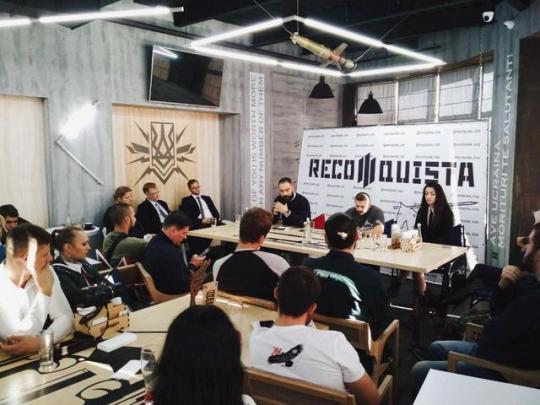
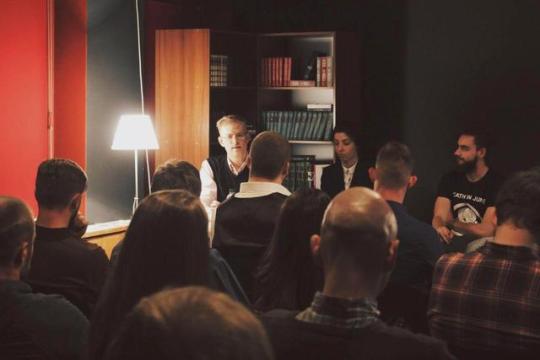

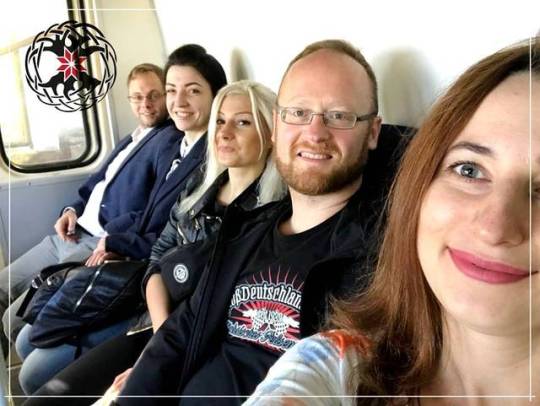
The Azov Movement in the West: achievements in 2019
Despite the fact that the official agenda of National Corps is a course towards Intermarium (Adriatic-Baltic-Black Sea Union), the years 2018 and 2019 were marked not only by regional events of the Intermarium Support Group, founded by Andriy Biletsky, Leader of National Corps, but also by popularization of our project in Western Europe and establishing of cooperation with both friendly Western European parties and those influenced by pro-Russian lobbyists. Along with it, we find sympathizers of Central and Eastern European Union among political forces and media platforms of the United States.
Having engaged in our activities, we adhere not only to the principle of paneuropeanism and alternative universalism, which shall prevent us from regional isolationism in the 21st century. Nor solely to the possibility (yet remote possibility) of the alternative of the EU all-European integration based on Central and Eastern Europe in case of growing animosity and decentralization of Europe.
It is a high time to admit that pro-Russian threat in Europe is tied not only with right-wing populists and “radicals”. After all, such influential right-populist parties like Polish PiS (Law and Justice) and Estonian EKRE (Estonian Conservative People’s Party), which lined up a fifth of seats on parliamentary elections, assume anti-Kremlin geopolitical attitude. Furthermore, namely these parties: both EKRE or Latvian coalition party “National Alliance” – are actual and potential Intermarium Support Group partners.
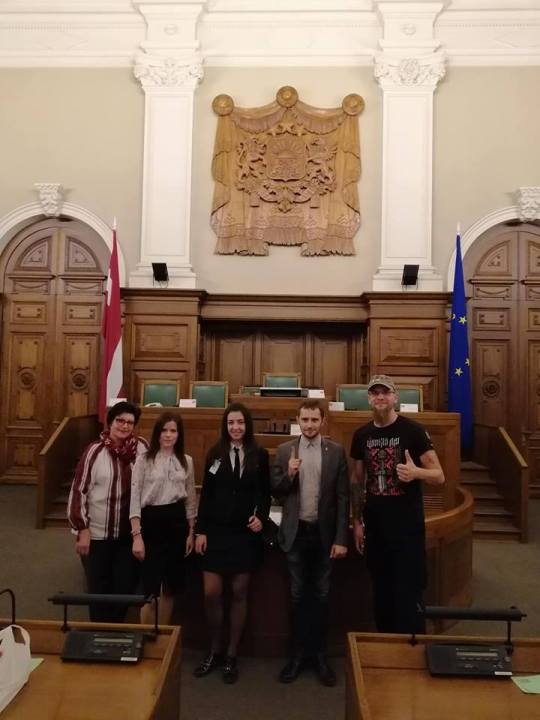
The problem is of another kind: not only a potentially pro-Russian coalition gathers in the European Parliament around the Italian Lega and German AfD – official Berlin, an economic leader of the EU, gradually weakens its resistance against Nord Stream 2, the pipeline which shall be built in circumvention of Ukrainian territory and rests on not only Russian and German but also Austrian, Danish and French funds. Following its own interests, neoliberal European Union persuades Ukraine to “conciliate” with the Russian Federation, which, in its turn, contradicts the interests of the US and some Central and Eastern European Countries only – again, “right-populist”.
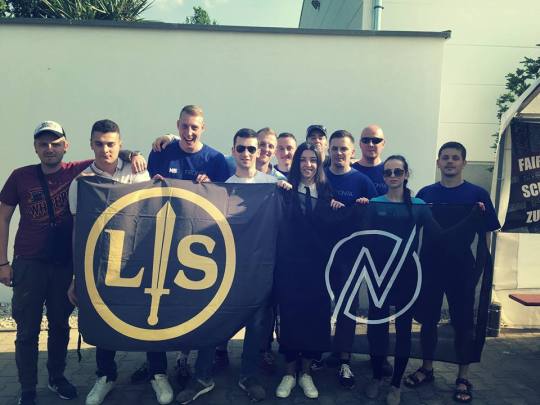
Under such conditions, it is important to prevent the Intermarium Support Group’s activites from deceleration, especially in the light of electoral success of the Finns Party, The Swedish Democrats, Danish People’s Party and other parliamentary forces of the region, which are currently either in the danger zone, or already cooperating with pro-Russian anti-immigration colleagues from Western Europe. Furthermore, given the lack of political unity among such parties, it is worth to give a due time alternative for those willing to think strategically and to avoid the fate of Putin’s fan club.
However, it is no less important to multiply our informational presence in Western European and American informational field via cooperation with “pro-Ukrainian” organizations and even their separate structures.
The starting point of informational expansion of the Azov Movement in the Western European field shall be considered to the Paneuropa Conference, which took place 28 April 2017 in Kyiv under the auspices of all-European Reconquista movement founded in 2015 on the back of mass foreign volunteer support in the National Liberation War in the East of Ukraine. This conference, dedicated to the idea of the alternative to European integration and geopolitical cooperation, gathered representatives of French, Italian, German, Swedish, Croatian, Polish, Lithuanian, Latvian and Russian emigrational political forces supporting a persistent course towards the creation of a sovereign Paneuropean confederation.
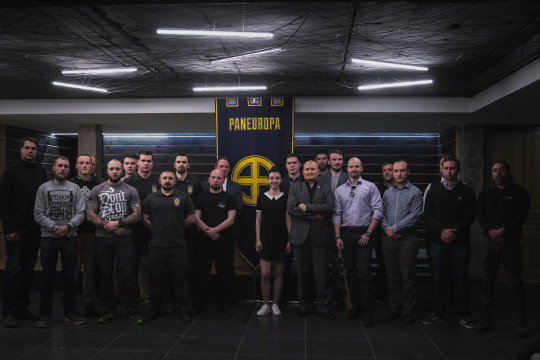
On October 15, 2018, the second Paneuropean conference was held in Kyiv, which was visited by local political forces, but also by speakers from Italy, Germany, Norway, Sweden, and the US. Similarly to the constituent conference, it included both the political, party element and the metapolitical component represented by Western intellectuals and bloggers associated with the Third Way, identitarian movement, French New Right (Nouvelle Droite) and American Alt-Right. Both conferences have gathered such prominent Western pro-Intermarium metapolitical thinkers like Gabriele Adinolfi, Pascal Lassalle, Marcus Follin (The Golden One), and Greg Johnson.

Active expansion of the Azov Movement into Western geopolitical and metapolitical sphere has begun with the participation of its representatives Victoria Polunina and Olena Semenyaka in the paneuropean congress named REGeneration Europa, which was organized on May 11-12, 2018, in the German town of Riesa by a youth branch of NPD, Junge Nationalisten. Though a marginal pro-LDNR Russian group was also represented at the conference, which provoked the pro-Ukrainian wing, it was the first mass Western European event marking the start of the further Azov “tour” across Western Europe on the invitations from the interested in the prospects of our cooperation.
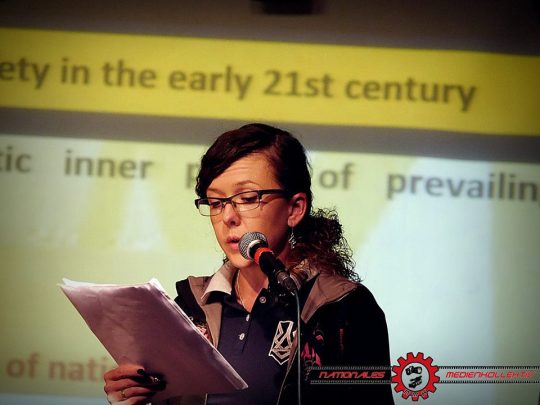
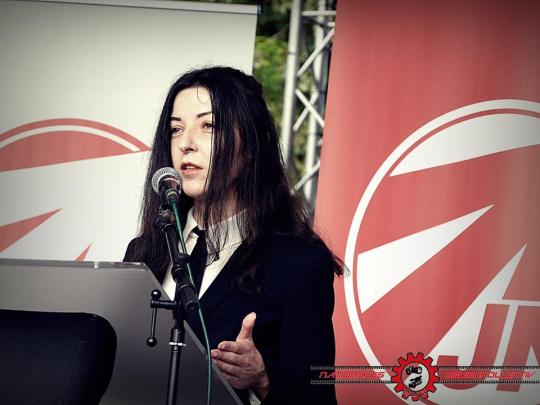
Next year, in spite of a fact that the NPD party has a split on the question of a military and geopolitical conflict between Ukraine and Russia, its youth branch took part in the second Paneuropa Conference in Kyiv and already on February 15-16, 2019 international secretary of National Corps Olena Semenyaka accepted the invitation of the NPD in Saxon Switzerland and the metapolitical center Haus Montag to speak at the event in Pirna in the course of which she described the history of the Azov Movement, the next day after the march in memory of victims of Dresden bombardment.
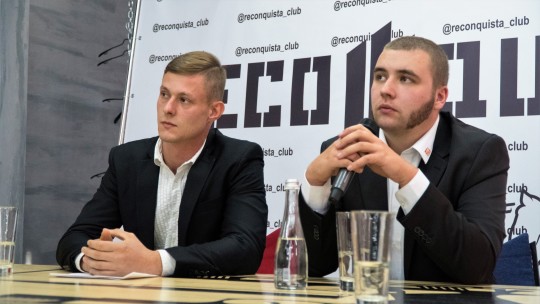
Among all described projects of the Azov Movement, the most challenging, but promising one is the geopolitical program of National Corps: Intermarium defense union as a platform for the alternative to the EU sovereign Paneuropean union. The false rivalry of the West and the Russian Federation creates the unique chance for the intended “buffer zone,” Eastern Europe, to become the center of the restoration of the all-European geopolitical subjectivity.
Moreover, this event was the first in the cycle of events within the framework of the «Ukrainian Year» in Germany, on the initiative of Thomas Rackow, the author of the charity German-Ukrainian-Norwegian Kraftquell (Source of Power) project aimed at organizing the vacation for veteran Ukrainian families in Germany and Norway as a sign of the solidarity of the European family with the belligerent Ukraine. He announced this project during the Paneuropa Conference II in Kyiv and on completion of the speech by Olena Semenyaka in Pirna.

In addition, namely on his initiative, Olena visited the annual convention of autonomous Norwegian nationalists in Eastern Norway who were interested in the geopolitical program of National Corps and supported the Kraftquell project.

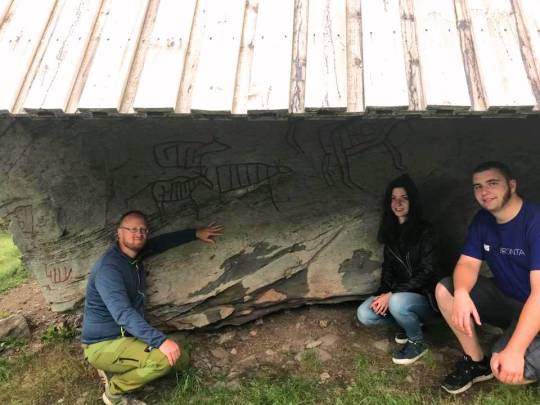
In June 2018, Olena Semenyaka also delivered a speech to the audience of Flamberg Club, the identitarian metapolitical center in Halle, within the framework of an event entitled “Ukrainian Evening: geopolitics, ideas, prospects”. She revealed the basis of Ukrainian state building, identity, the conflict with Russia, history and structure of the Azov Movement and the geopolitical project of Intermarium.
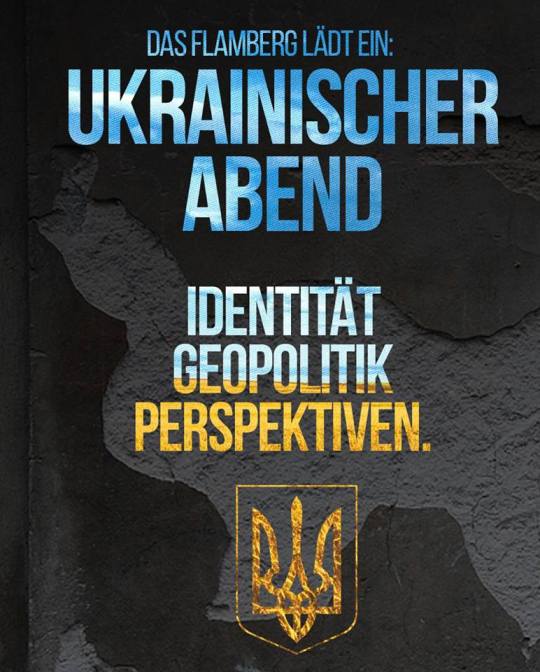
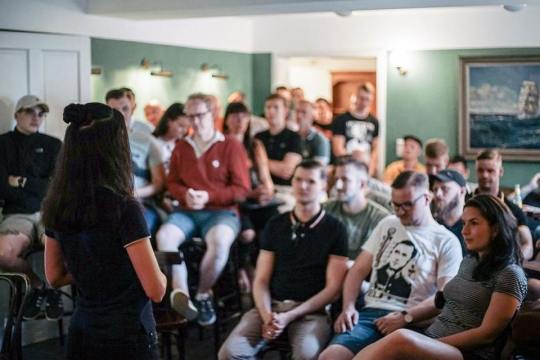
As soon as 3-5 of August 2018, Olena Semenyaka also delivered a lecture at the first Jungeuropa Forum organized in Dresden by Jungeuropa Verlag, the friendly publishing house of identitarian Third Way literature. Olena described to German and Austrian identitarians the geopolitical, cultural and philosophical foundations of Intermarium.
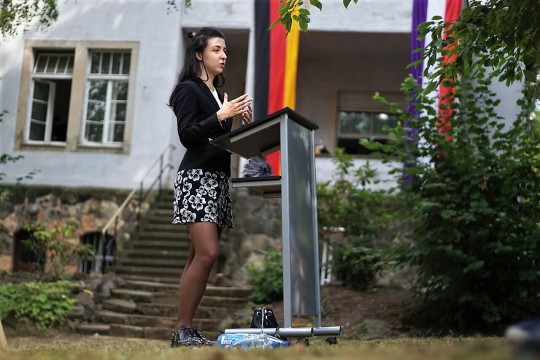
June 7, 2018, Olena Semenyaka revealed the metapolitical strategies of the Azov Movement at the cultural and political event entitled “The Youth Storms” in Kirchheim, Thuringia on the invitation of the German party Der III. Weg (Third Way), a long-time ally of the Azov Movement, the first ones who united with the German branch of the Reconquista Movement in their efforts to destroy the information blockade around the fight of Ukrainian patriots.
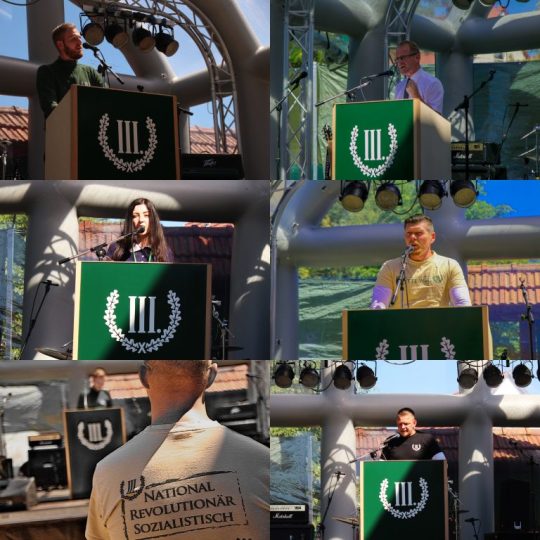
In the wake of the Third Conference of the Intermarium Support Group in October 13, 2018, which, among others, was attended by the representative of the Academic Legion Project of the Ministry of National Defense of Poland Damian Duda and Croatian Armed Force General Brigadier Bruno Zorica, right on February 15-16, 2019, Eugene Vriadnyk, combat veteran of the Azov Regiment, founder of Plomin publishing house, delivered a speech on his vision of archeofuturistic future of Central and Eastern Europe at the Prabudimas Conference in Vilnius, as well as took part in a torchlight procession in honor of the anniversary of Lithuania’s independence, which were organized by the Kryptis ethnofuturist association.

January 7, 2019, Olena Semenyaka participated in the commemoration of three young Italian patriots killed by communists in Acca Larentia massacre. The march, dedicated to the bloody event of the Lead 70-s, has become an all-Italian sacral rite precisely thanks to the activity of Casa Pound Italia. This organization has also brought this event even to the all-European and transcontinental level, gathering participants as far as from Quebec. This visit has strengthened the partnership with CasaPound Italia represented by their international correspondent Alberto Palladino at the Second Paneuropa Conference in Kyiv.
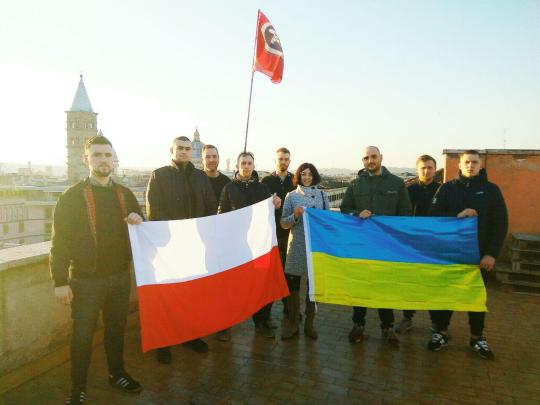
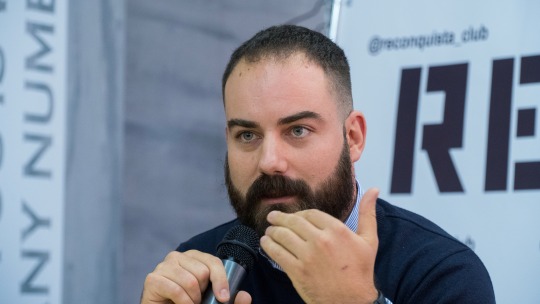
Besides, National Corps has been a participant of the Third Etnofutur Conference, which took place on the 23rd of February in Tallinn. This event is held annually by the youth organization of Estonian People’s Conservative Party (EKRE), Blue Awakening (Sinine Äratus). Traditionally, the strong emphasis has been laid on the conceptual synergy of the nationalist speakers of the Intermarium region. Olena Semenyaka has delivered a speech entitled “Middle Europe in the Age of Caesarism and the Purpose of Ethnofuturism”. In her speech, she mentioned that namely the Azov Movement is the brightest example of Ethnofuturism as a combination of innovative technologies with the policy of protecting ethnocultural identities.

Having referred to Oswald Spengler’s concept of Caesarism as the final period of the historic cycle of the West which began with the first world war, Olena presented Intermarium as space where Old Europe can return to life again entering a new cultural and civilizational turn.
In addition, National Corps sent his representative to support EKRE ahead of parliamentary elections. Fortunately, the allied party showed an exceptionally high result. On February 24, Olena, also traditionally, participated the celebration of the independence of Estonia and anniversary torchlight parade.
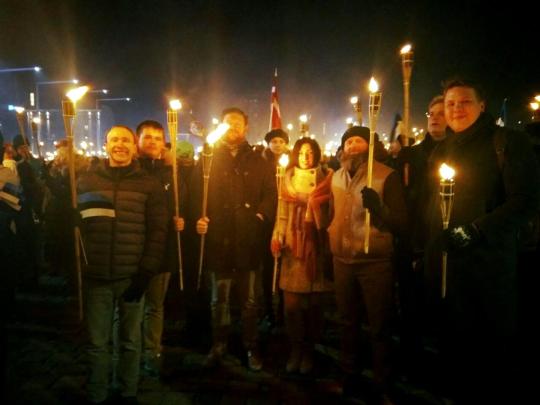
On March 30, 2019, Olena Semenyaka spoke at the Pan-Scandinavian Scandza Forum founded by Fróði Midjord. The forum addressed the problems of the lacking freedom and imported chaos in modern Western societies (”Anarcho-Tyranny”). Having investigated the issue in the context of Ernst Jünger’s criticism of neo-totalitarian police state, as well as the need to put modern audiovisual technologies into service of our own historical visions, she called the region of Central and Eastern Europe the space of political freedom where it would be possible to develop the paneuropean infrastructure for such purposes. The event was also attended by members of Swedish Democrats and Alternative for Sweden.
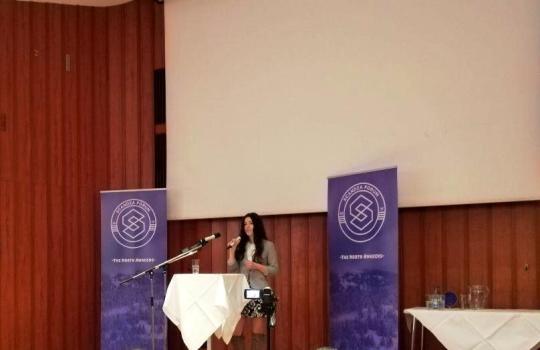
After the Scandza Forum, Olena Semenyaka became the guest of the “Anton och Jonas” video program during which she discussed the course of the Maidan Revolution, the reasons for the geopolitical confrontation with Russia, the milestones of the formation of the Azov Movement and the Intermarium project. Her interlocutors were Anton Stigermark, the representative of the Alternative for Sweden party, the author of the “Memetic Warfare”, who also participated in the MMA tournament at the Kyiv Reconquista Club, and Jonas Nilsson, coordinator of the Boer Project, also the MMA enthusiast and a former instructor of the Azov regiment, which hosted a lot of Swedish military volunteers.
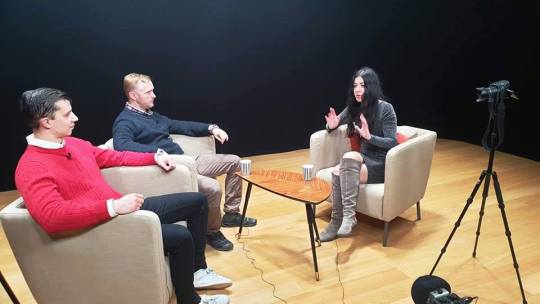
Finally, on April 6, 2019, the National Corps, represented by the international secretary and coordinator of the Intermarium project Olena Semenyaka, took part in the Awakening II Сonference in the Finnish city of Turku. At this conference, Olena made a presentation "Finnish-Ukrainian Cooperation Then and Now As Seen by National Corps” during which she discussed the diplomatic cooperation of Finland with the Hetmanate and the UPR in the previous century, in particular, thanks to the ardent Finnish advocate of the Ukrainian national liberation movement Hermann Gummerus, as well today’s step-by-step integration program of the Intermarium Support Group.
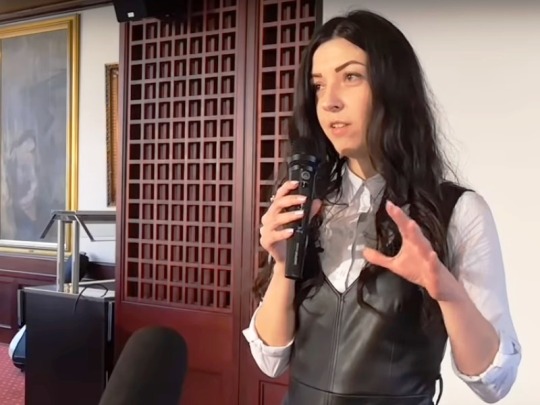
In addition to foreign speakers and guests, the event was visited by members of the Finnish identitarian organization Suomen Sisu and the youth branch of the Finns Party. Finnish audience, which had its own experience of Russian-Finnish wars, was fascinated by the natural geopolitical vector towards Intermarium. It is worth to mention that the Finns Party has lined up 39 parliamentary seats out of 200 during the recent election.
It is planned that Olena Semenyaka will take part in Forum Prisma Actual on May 4, 2019, in Lisbon, on the invitation of Escudo Idetitario, Portuguese identitarian organization. Along with developed Spanish branch of the paneuropean Reconquista movement, Portuguese patriots couldn`t help resonating with the cause of the novel Ukrainian “conquistadors.”
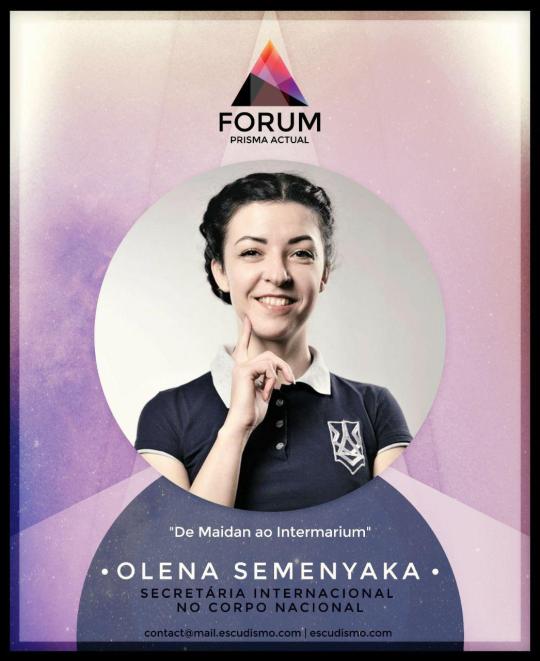
Among the Southern European countries, the great interest in Azov’s activity is shared by Greece whose patriotic audience also feels the cultural and geoeconomic affinity towards the project of Intermarium and invite National Corps to their land.
However, the priority of the Intermarium Support Group for the second half of 2019, of course, is holding the Fourth International Conference bringing the regional European integration to the new level. According to preliminary plans, the conference will be held in Zagreb, a center of the Adriatic angle of Intermarium.
#National Corps#AZOV movement#Andriy Biletsky#Intermarium Support Group#Olena Semenyaka#eugene vriadnyk#Paneuropa#reconquista movement
4 notes
·
View notes
Text
Bientôt la dissolution de #GenerationIdentitaire... (dans le trifluorure de chlore) #terrorismeXdroite
Bientôt la dissolution de #GenerationIdentitaire… (dans le trifluorure de chlore) #terrorismeXdroite

J’ai déjà écrit ici ce que je pensais de la dissolution de ce genre de bas de plafond, ou plutôt de leurs mouvements dangereux à forte toxicité sociale. Cependant, je suis certes fort satisfait d’apprendre que ce gouvernement si peu suspect d’antifascisme, radical ou non, étudie la question de l’interdiction de ce mouvement de crapules xénophobes, dont beaucoup ont été pincées la main dans le…
View On WordPress
#"Defend Europe"#Christchurch#financement de Génération Identitaire par un terroriste#FN#génération identitaire#Greg Johnson#Jared Taylor#Mark Collett#Martin Sellner#Martin Semlitsch (pseudo de Lichtmesz#Millenial Woes#néo-nazisme#Olena Semenyaka#RN#scandzaforum#suprémacisme blanc#terrorisme extrême droite
0 notes
Text
Austrian Academic Institute Revokes Fellowship Given to Far-Right Figurehead
Austrian Academic Institute Revokes Fellowship Given to Far-Right Figurehead
Olena Semenyaka. Photo: YouTubeAn Austrian academic institute has revoked a fellowship to some Ukrainian postgraduate following the embarrassing discovery that they would be a key figurehead within the global far-right.The Vienna-based Institute for Human Sciences (Institut für die Wissenschaften vom Menschen, or IWM) stated Monday the fellowship awarded to Olena Semenyaka, the mind of worldwide…
View On WordPress
0 notes
Video
youtube
After Jünger was banned from publishing due to refusal to exclude the critical reference to the 73rd Psalm, the Army published his "Myrdun: Briefe aus Norwegen" in 1943. In spite of having close relations with many activists of Resistance and even members of the failed plot aimed at assassination of Hitler (Otto von Stülpnagel and Hans Speidel), which was attempted on July 20, 1944, Jünger did not participate directly in the conspiracy, although his tract "Peace, an Appeal to the Youth of Europe and to the Youth of the World" (1943) was very popular in this and other circles. His only punishment, as opposed to the fate of the executed, was dismissal from the Wehrmacht as "unfit for service." Hitler, who admired Jünger's war prose, as usual, forbid Goebbels and Goering disturb him.
In 1944 his Jünger's son Ernst was sent to a punishment battalion for subversive conversations in his unit. It was told that young Ernst said his fellow soldiers "If we win, we'll have to hang Kniebolo" (it is said that Jünger described Hitler under this codename as a combination of words "knien" (kneel) and "Diablo" in his French diaries). Young Ernst was killed near Marble cliffs of Carrara in Italy on 29 November.
"On the Marble Cliffs" is often viewed as an allegory of Nazi regime; however, in the same notes to the novel Jünger wrote that it became clear even in the occupied France that this was the "shoe that fits various feet." In later interviews he repeated that such allegories might be viewed as exposition of Stalin's regime. As a matter of fact, in the notes Jünger expressed his discontent regarding the very political interpretation of the novel which definitely goes beyond the current and the episodic in human life.
(Olena Semenyaka, "Ernst Junger’s “On the Marble Cliffs” as a Parable of Staying True to Yourself," Politosophia, April 15, 2012).
8 notes
·
View notes
Photo



A welcoming speech by Olena Semenyaka at Pact of Steel III conference
I welcome everyone at the 3rd edition of the annual Pact of Steel conference on behalf of the paneuropean Reconquista movement, Militant Zone and Plomin Club. This conference cycle is timed to Winter Solstice and *a special kind of* Black Metal Asgardsrei festival, already 7th.
It is no surprise that we gather here today before the musical part, because it has never been a purely musical event, just like the very genre of BM, in its original form, is above "only music."
Initially, this Pact of Steel between Eastern and Western Europe was "signed" in Russia. However, the increasing oppression of Russian nationalism by Putin's regime soon closed this opportunity. The rebirth of Asgardsrei festival happened in the post-revolutionary Ukraine, for the first time in 2015. Since then, it outgrew its initial format: this year, it will be a 2-day festival, in fact 3-day, and we needed a much bigger venue than last year.
Yet, united against the common enemy, quasi-Soviet Putin's Russia, Ukrainian, Russian and Belorussian nationalists gave birth to something bigger: the program of the Great European Reconquista. In 2016, it transformed into the geopolitical program of Intermarium, the union of Central and Eastern European countries, as a platform for the alternative European integration the endgoal of which is the Paneuropean confederation of sovereign nations, or simply Paneuropa. The first Paneuropa conference took place in Kyiv in 2017.
This event would never be possible without the feat of Ukrainian nationalists, their comrades from Russia, Belarus and other Eastern and Western European countries who laid down their lives not only for the independence of Ukraine, but, above all, for the rebirth of the West. This is our duty now to make sure that their sacrifice was not in vain.
Last year, Pact of Steel conference bore the title "After the Darkest European Hour." For we believe that after the darkest and longest European night, Kali-Yuga, Iron Age, there will inevitably be a new dawn. And the natural cycles, the day of Winter Solstice in particular, to which the current conference cycle is timed, promise us this eternal reccurrence.
But not only this. The Heathen worldview itself shows the way to our spiritual homeland out of the emptiness of European nihilism brought by secularized desert religions. European genetic code and Heathenism is represented in its purest archetypal form precisely in the Nordic countries, and today we are lucky to welcome here Frodi Midjord from The Faroe Islands, the founder of Scandza Forum, which lays a special emphasis on the nordic identity, and the host of "Guide to Kulchur" podcast. He will talk about the metaphysical foundations of European Heathenism, referring to Martin Heidegger's fundamental ontology in particular.
Afterwards, we will listen to Hendrik Möbus who'll have a rehearsal right after his speech along with legendary Absurd band that will headline Asgardsrei VII festival. We are extremely proud that Asgardrei festival was one of the reasons that inspired him to "return" to the public space and appear today here with the lecture about the White God of War, Roman von Ungern-Sternberg. The sun of Europe rises in the East, and this symbolical for the Reconquista Movement figure may be considered as the Wild Hunt incarnate.
youtube
#asgardsrei#pact of steel#Olena Semenyaka#reconquista movement#Fróði Midjord#Hendrik Möbus#Roman von Ungern-Sternberg#Nordic Paganism#winter solstice#black metal
4 notes
·
View notes
Photo

Olena Semenyaka on the Ukrainian Crisis Part II for Guide to Kulchur podcast
Olena Semenyaka, international secretary of National Corps, researcher of Conservative Revolution, Ernst Jünger’s legacy and his dialogue with Martin Heidegger on the prospects of a new metaphysics of the West in particular, whose “academic and geopolitical activities coincide” (meaning the paneuropeanism of the Third Way, which is another title for Conservative Revolution), summarized in a written form the main points of her conversation with Fróði Midjord on the Ukrainian Crisis Part II, which followed the discussion of the same topics from a Russian perspective with Prof. Alexander Dugin, for the Guide to Kulchur podcast: https://www.counter-currents.com/2019/01/understanding-the-ukrainian-crisis-part-ii/
Ukrainian history and identity in relation to Russia
- (proto-)Ukrainian ethnogenesis and the statist tradition: apart from the Slavic populus, it is worth mentioning Cimmerians, Scythians, Sarmatians (the Indo-Iranian branch of the Indo-European language tree), Gothic Kingdom (for the first time uniting the Ukrainian mainland with the Crimea), Kyivan Rus, the Grand Duchy of Lithuania, Polish Commonwealth, Cossack State and Hetmanate, Russian Empire, Austro-Hungarian Empire, Ukrainian People's Republic, Soviet Union, independent Ukraine, Maidan Revolution and the rebirth of the third geopolitical way in the form of Intermarium (Adriatic-Baltic-Black Sea Union);
- Kyivan Rus as the "cradle" of three modern peoples: Belarusian (the closest one to the Ukrainian linguistically), Ukrainian and Russian; the Moscow Kingdom (emerged much later than Kyivan Rus) as one of competing centers striving for power in Eastern Europe and Eurasia (several historical examples devoid of any specifically "anti-Russian" impulse: destruction of the Volga route by Kniaz Sviatoslav in favor of the trade route "from the Varangians to the Greeks" passing through Kyiv, defeat of the Moscow Kingdom's army by joint Lithuanian-Ruthenian forces at the battle of Orsha in 1514, destruction of Moscow in 1618 by Ukrainian Hetman Petro Sahaidachnyi, the creator of the Zaporozhian Host and the patron of Ukrainian culture well-known for his successful campaigns against Turks and Tatars), different ethnic influences / admixtures and geopolitical tendencies of Ukraine and Russia also due to purely geographic reasons;

- a decent status of the proto-Ukrainian (Ruthenian) elite within the Grand Duchy of Lithuania and the rebirth of Ukraine's statist ambitions during the Cossack uprisings against Poland in XVI-XVIII centuries (the first national liberation struggle of the Ukrainian nation (against the Polish Commonwealth) according to the Ukrainian nationalist historiography). Ukrainian tensions with Catholic Polish magnates, in turn, were exploited by the Orthodox Russian side in an attempt to gain control over the Cossack State;
- the blessing and the curse of any central continental state at the intersection of transit routes and the challenge to the Ukrainian Cossack State caught between the Polish Commonwealth, the Ottoman Empire and Crimean Khanate and the Russian Empire; the military alliance with the Russian tsar signed at the Pereyaslav Council in 1654 by the great Ukrainian statesman, Hetman and the leader of the anti-Polish uprising Bohdan Khmelnytsky which ended with the liquidation of the military center of the Cossack State, Zaporozhian Sich, and the autonomy of Hetmanate.

Although there has never been a mass uprising against the Russian Empire as it was the case with regard to Poland, already in 1709 Ukrainian Hetman Ivan Mazepa sided with the Swedish King Charles XII and was defeated at the Battle of Poltava by Tsar Peter the Great (who renamed Muscovy as the Russian Empire), thus becoming the symbol of Ukrainian anti-Russian "treason" for centuries.

Appr. 30 years later Peter I invited Cossacks to resettle in the lands of Central and Southern Ukraine which thus officially belonged to the Lower Zaporozhian Cossack Host and were named "Novorossiya" by the Russian Tsardom just like the British Empire created New England or New Scotia in the newly colonized lands; already in 1775 Zaporozhian Sich was destroyed by the Russian Empress Catherine II "in response" to the Cossack contribution to the reconquer of Crimea by the Russian Empire during the Russo-Turkish wars and their centuries-long defense of the southern borders of Europe; parts of the Cossack Host resettled in the Kuban, currently, completely russified lands where previously dominated the Ukrainian ethnos, another part established the Trans-Danube Sich;

- differences of the Ukrainian and Russian statist and political traditions: in Russia, the political rule was far more autocratic and absolutist, the main role belonged to tsar, and both aristocracy (boyars) and peasantry mostly were completely satisfied with their positions, whereas in Ukraine the Hetmanate was a kind of electoral monarchy providing strong democratic rights to Cossacks who elected their military leaders; besides, the vertical mobility in the Ukrainian society has always been very high, and the main social lift for the natural aristocracy was the participation in constant wars;
- the second Ukrainian national liberation struggle took place in 1917-1921 after the collapse of the Russian and Austro-Hungarian Empires, when the newly created Ukrainian People's Republic had to counter the Bolshevik invasion: presicely due to the failure of this struggle, Ukrainians have to face now the third national liberation struggle against the quasi-Soviet Russian Federation after the 25 years of fake "independence";
- the borders of the modern Ukrainian state (Bessarabia and Bukovyna were adjoined in 1940-s by Stalin, but aforementioned Bohdan Khmelnytsky conducted active geopolitical expansion in the directions of Moldova and Romania) in no way were "artificial": they were determined by the Ukrainian People's Republic due to the objective prevalence of the Ukrainian population in these territories and were accepted by the Bolsheviks; moreover, initially, the Kuban region and parts of modern Belarus were also included in the territory of Ukraine; Ukrainian colonel Petro Bolbochan liberated the Crimea from the Bolsheviks in 1918, and the Ukrainians (including my grandparents) completely rebuilt the infrastructure of Crimea after the Second World War, not mentioning the huge contribution of the Cossacks to the struggle against the Turks and Tatars, so, to say the very least, historically, this territory cannot be considered unequivocally "Russian."

Maidan Revolution: Nationalists vs. “Euromaidan”
I can fully agree with the portrait of the overthrown president Victor Yanukovych as described by Alexander Dugin in the preceding Guide to Kulchur podcast: just like all the other presidents of "independent" Ukraine, he was not particularly pro-Russian, he simply served those who paid the most. It was him who initiated the EU association agreement. Under his rule was held the first secret gay pride parade, which was protected by the special riot police "Berkut" (disbanded after the revolution). However, he repressed Ukrainian nationalists (among others, Yanukovych imprisoned the leader of the future National Corps movement Andriy Biletsky, as well as fabricated the case against the members of his organization, The Patriot of Ukraine, who were detained for plotting the explosion of the monument to Lenin) and suppressed Ukrainian small and medium business. Yet, when Putin forced Yanukovych to freeze the EU association negotiations (after all, not so beneficial for Ukraine even purely economically) and start integration into the Eurasian Customs Union, we did not pay any attention to the protests of the middle class which considered the EU an economic paradise.

But, when the students were violently beaten by Berkut, Ukrainian patriots perceived it as a chance to transform the peaceful pro-EU protests into the anti-governmental national revolution, and succeeded in it. When the phase of violent clashes between the police and hired thugs, on the one side, and nationalists, on the other, began in the streets, the liberal pro-EU opposition played zero political role. One could say that it was a backup for the nationalists who were throwing molotovs at the police and were capturing administrative buildings, but, on the other hand, by "supporting" the protesters, the West tried to hijack the revolution and, in fact, has always disapproved of the national-revolutionary methods. So the rivalry between the "Euromaidan" and the national-revolutionary Maidan is obvious enough to understand what side is worthy of and requires your support, especially if you wish to weaken the other side.
As a result, the overthrow of the regime was successful, however, the national revolution is far from complete. Just like the socialist revolution, which failed in 1905 and succeeded only in 1917, the Ukrainian national revolution might take decades. Right Sector, as a broad national-revolutionary movement, failed to produce a new political class that would be ready to take power after the fall of Yanukovych's regime; consequently, the power vacuum was filled by liberals, oligarchs from the previous political era like Petro Poroshenko and even rebranded members of Yanukovych's Party of Regions.
This drawback is currently being corrected by the National Corps / Azov Movement as the fastest developing nationalist movement in Ukraine: it has a parliamentary wing, the National Corps party which is represented in every region of Ukraine and counts in its ranks over 10,000 activists, a paramilitary structure, National Militia, often described by the globalist media as the modern "SA," over 30 social and cultural projects as independent NGOs which allow National Corps to practice entryism in all social fields, and, last but not least, the military wing unseen since the times of WW2: the Azov Regiment of the National Guard of Ukraine (subordinate to the Ministry of Internal Affairs), the only volunteer battalion that was expanded to the level of the regiment and the most combat-ready unit of the entire Ukrainian armed forces. A special attention is paid to the educational programs: military ones aimed at the modernization of the Ukrainian army, political ones preparing the future political leaders and metapolitical structures closely cooperating with the international department; the clash between the liberal and the nationalist flank will continue on a larger scale as we are striving for power and are ready to implement different scenarios.

The conflict in Eastern Ukraine
At the same time, the cultural difference between Eastern and Western Ukraine is much exaggerated. I say it as a bilingual person and a member of the Azov Movement which was born in the Eastern Ukrainian industrial city of Kharkiv and is dominated by mostly Russian speaking activists from Eastern Ukraine. Moreover, there are many ethnic Russians in the ranks of our movement. Furthermore, even my parents have a kind of cultural nostalgia for Soviet times and would never believe that the war with Russia is possible, but they would never enter the streets to oppose the Ukrainian government and soldiers either. As a matter of fact, the local residents have never played an active political role in Eastern Ukraine. People who were taking down the Ukrainian flags from the administrative buildings were the crew of saboteurs brought from Russia. One of such crews, which included the leader of the Kremlin-backed forces Givi, attacked the office of The Patriot of Ukraine at Rymarska Street in Kharkiv, but was repelled and retreated. The biggest Eastern Ukrainian cities (Kharkiv, Odessa, Mariupol) remained Ukrainian precisely thanks to the efforts of Ukrainian nationalists and ultras who expelled relatively small groups of "professional separatists." That's why we never use the expressions like "the civil war in Ukraine." Activists of our movement from Donetsk and Luhansk observed the developments since the very beginning and could tell the difference between the local newborn "separatists" who did not know how to handle weapons and single out the political enemies and silent Russian military who supervised them. It was the latter’s idea to place the firing points in the residential areas…
The so-called Donetsk and Luhansk People’s Republics, as well as the entire project of “Novorossiya,” as of now, is a complete failure. Above all, it has nothing to do with the defense of the Russian national identity and language. Just like the occupied Crimea, it is full of revanchist Soviet motives, ideas and rhetoric. The only difference is that LDPR are dominated by bandit clans who often kill each other without any interference of the Ukrainian secret services (it was the fate of the most famous “rebels” Givi and Motorola) or, when the leaders of these “republics” happen to know too much or their political ambitions grow, they are simply being eliminated by their Russian supervisors. You can find there Italian and Spanish leftists, crazy Latvian / Ugandan National Bolshevik Benes Ayo, commies from Texas, Chechen battalions and Buryats from remote Eurasian republics of the Russian Federation.

There was only one reportedly right-wing battalion “Rusich” which withdrew itself from the territory of Donbas due to a loss of understanding “what they were fighting for.” Another conservative icon of “Novorossiya,” colonel of FSB and the former “Defense Minister” of DPR Igor “Strelkov” Girkin, could be recently seen on a solitary picket line against the intent of the Russian authorities to return the Kuril Islands to Japan. Devoid of any popular support, he called it a state treason. This and many other facts prove that the project of “Novorossiya,” supposedly driven by the “civil war” in Ukraine, since the very beginning has been orchestrated “from above” by Putin. When the Russian authorities decide to stop the artificial conflict in the Donbas region, Girkin will be probably protesting alone, too;

Not that there was no Ukrainian contribution to the collapse of “Novorossiya.” MPs of the Russian Duma admitted that regaining control over Mariupol by the Ukrainian side put an end to the military expansion of the Russian Federation in Southern Ukraine. Mariupol, the biggest after occupied Donetsk (half a million) city in the Donetsk region, was liberated in 2014 by the Azov battalion, which prevented Russia from paving a continental corridor from the Rostov region to the Russia-controlled grey zone in Moldova, Transnistria. Actually, the Azov battalion reached the suburbs of Donetsk and was ready to storm the city (by the way, the first fallen volunteer at that point was Russian). Likewise, the only successful counter-offensive of the Ukrainian armed forces, which ended with the Shyrokyne operation, was conducted by the Azov regiment. Since the initiation of the peace Minsk agreements in September of 2014 as a result of the first open attack of the Russian army during the Ilovaisk trap, which required the ceasefire, the Azov regiment got the chance to launch this counter-attack only in 2015 when the forces of DPR shelled the residential area in Mariupol, which took lives of 30 civilians.
The role of the West in the Maidan Revolution and War with Russia
One can often hear the idea that the West started the revolution in Ukraine to separate Ukraine from Russia by integrating Ukraine into the euroatlantic structures (the EU, NATO) and unleash the war on Russia. Although it is hard to deny that the West exercises geopolitical soft power in Eastern Europe and Ukraine willing to keep this area in its zone of influence, the latter is still limited as compared to the Russian factor both in the Ukrainian and Belarusian political systems which have never been truly “independent.” Moreover, those who believe that the EU and NATO membership is the worst that could happen to Ukraine in this turbulent period of its history, can relax and go home: according to the well-known statement by Jean Claude Juncker that was made in 2016 and was confirmed on many occasions by the EU and NATO leaderships, Ukraine will not become a member state neither of the EU, nor NATO in the next 20-25 years, to say the least. And it goes without saying that within this period of time both international structures may cease to exist. Indeed, given the crisis tendencies in the EU (economic problems in Greece, inability to sustain even small Central European EU member states, terror attacks, migrant crisis, Brexit and now mass protests in France), Ukraine, the biggest European country, is hardly welcome in the collapsing EU. Also, everyone remembers the words of Donald Trump about the possible withdrawal of the United States from NATO.
In other words, if the US wanted to “unleash the war on Russia,” Ukraine would be accepted in NATO as a member state which the US would thus be obliged to defend. But the reality is opposite: Barack Obama turned the blind eye to the annexation of Crimea and the invasion of Donbas by Russia, and Donald Trump avoids open confrontation with Russia outside of Syria and especially in Ukraine. Unwillingness to “irritate” Russia is the main strategy of the West in this conflict. Actually, the West gave the green light to the neo-Soviet ambitions of Russia back in 2008 when Georgia, which was denied a NATO membership, was invaded by Russia. The creation of “independent republics” of the South Ossetia and Abkhazia has become a rehearsal for the creation of the “Donetsk and Luhansk People’s Republics” in Ukraine.
Furthermore, if the US wanted to clash with Russia on the front lines, there was no need to welcome Ukraine in NATO; it would be enough to fulfill its obligations according to the Budapest memorandum signed by the US, UK and Russian Federation (later also supported by China and France) in 1994. Under the Budapest memorandum, Ukraine renounced its third largest in the world nuclear potential in exchange for the “security assurances” and the recognition of its political sovereignty and territorial integrity by the signatory countries. However, when one of the main signatory countries, the Russian Federation, invaded Ukraine and annexed Crimea, the West did nothing. And Russian officials did threaten Ukraine with nuclear strikes.
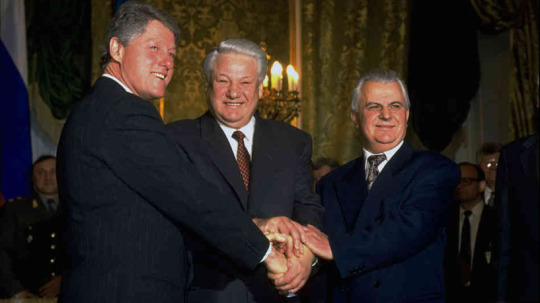
Likewise, Kremlin media spread fantasies about the massive military and financial aid of the US to the Ukrainian army, which is completely false. Only Lithuania, as a NATO member state, provided Ukraine with the lethal aid. As for the rest, due to the pressure of the pro-Russian and simply leftist lobbies, even American “hawks” were very hesitant to “fund” the war in Ukraine. Financial aid that does not reach the ruined post-Soviet Ukrainian army and a modest number of the Javelin anti-tank systems, which Ukraine will not be able even to repair due to the absence of the required technologies and facilities, are the only “military assistance” to Ukraine, in fact, left to its own devices in the confrontation with Russia.
As a result, most regional countries, in spite of being the NATO member states, are highly interested in the Intermarium defense union, especially the Baltics. Lithuanian allies, who shared with us their experience in the development of the territorial defense forces, told us many eloquent stories about pro-Russian lobbies proving in the 90-s that Lithuania “did not need the armed forces anymore.” After Georgia and Ukraine, Latvia, which has provinces and separate cities where the Russian minority already comprises the majority of voters (and in the Latvian case, as opposed to Ukraine, the conflict of the Latvian and Russian languages is really sharp as the Russian minority there is completely artificial), has all reasons to believe that NATO will not interfere if Russia starts another undeclared hybrid warfare in the Baltic States.
Also, we often hear that if Ukraine remained on friendly terms with Russia, we would preserve Crimea and would not suffer any economic problems. However, take a look at the recent developments in Belarus which is 80 % dependent economically on the mercy of Russian “Gazprom.” In December 2018, Russian Prime Minster Dmitry Medvedev announced that Russia is ready to “deepen integration” with Belarus, including the establishment of a single emission center, a single customs service, a court and a chamber in accordance with the agreement on the creation of the Union State of December 8, 1999. This announcement, as always, emerged right after Russia has outlined a new tax system which will make Belarus lose billions of money.

Similarly, Kremlin media often write about Ukrainian “neo-Nazis” being backed and funded by “Americans and Jewish oligarchs,” including the Azov regiment. However, it is enough to visit the site of the US State Department to find out that the Azov regiment of the National Guard of Ukraine is the only Ukrainian unit which cannot get any form of the US aid for ideological reasons. In times of the Maidan revolution, pro-Putin media associated Ukrainian volunteer battalions with the Jewish oligarch Igor Kolomoisky who supposedly funded them. In reality, he was a governor of the Dnipropetrovsk region, which was the last Ukraine-controlled central region bordering on the so-called zone of ATO (anti-terror operation), which means that the city administration provided transportation to units on their way to the front and nothing else. Although Kolomoisky is currently a protégé of a technical presidential candidate Zelensky, he is no longer a governor of the Dnipro region, and the biggest bank service of Ukraine, Privat Bank, which previously belonged to Kolomoisky, has been nationalized by Poroshenko. Not so long ago, pro-Kremlin platforms started spreading rumors about Israeli weapons of the Azov regiment soldiers. Again, the reality is different: way before the Maidan revolution, Ukrainian Ministry of Internal Affairs acquired an Israeli license on Tavor Assault Rifle-21, which has been produced in Ukraine since 2009 as a modified Ukrainian assault rifle Fort-221.

I could go on endlessly refuting similar examples of anti-Ukrainian propaganda, but the main point is that the Maidan Revolution did not bring to power new oligarchs of non-Ukrainian origin, and the situation in this respect is the same as in Russia. The second main point is that the West tries to hijack the results of the Ukrainian Revolution in the media sphere but is afraid to confront Russia and has never orchestrated anything in the Ukrainian streets. The West can be hardly called even a diplomatic ally of Ukraine, as the EU continues trading with Russia in spite of the economic sanctions, and only the Intermarium countries supported new sanctions against Russia after the attack on the Ukrainian military ships in the Sea of Azov. As opposed to Intermarium countries, Germany supports the Russian project of Nord Stream-2 gas pipeline which will bypass the territory of Ukraine. Peace Minsk agreements, pushed forward by the EU, are extremely harmful to the Ukrainian statehood, and only interference of National Corps in 2016 prevented the Ukrainian authorities from adopting the so-called Morel’s Plan which was advocated by Victoria Nuland. This plan allowed holding elections in the occupied zones of the Donetsk and Luhansk regions without the restoration of the Ukrainian-Russian border, which meant the continuation of the Crimean scenario as the illusion of a democratic referendum on joining Russia. Luckily, in contrast with Girkin’s solitary protests against the state treason, National Corps could afford gathering 10,000 activists who came to the Ukrainian Parliament and threatened the MPs to take them out of the building by force if they dare to vote in favor of Morel’s plan (which, of course, was not accepted).

Intermarium as the Third Geopolitical Way on Brzezinski’s Grand Chessboard. Assessment of Putin’s Russia
This naturally leads us to the geopolitical program of National Corps as a vanguard of the Ukrainian nationalism of the new generation which offers the alternative both to the West and Putin’s Russian Federation, basically, two forms of globalism which relate to each other as the late Roman Empire would have related to Carthage unless the latter had been ruined by that time.
While many understand why non-critical Westernization is not good to Ukraine, our rejection of Putin’s Russia requires additional explanations. Practically, it is hard for Ukrainians and Eastern Europeans in general to idealize Russia simply because the Intermarium region is comprised of monoethnic countries each of which has preserved its national identities and has a titular nation, whereas the Russian Federation is a multi-ethnic state with huge migration tendencies from the non-Russian parts of the Russian Federation and neighboring Eurasian countries. As opposed to Intermarium countries, including Ukraine, the Russian Federation signed the UN global migration pact, having underlined a positive role of migration for its state building.
Late Soviet Union was much wiser than the modern Russian Federation which ruined the Slavic unity: it has managed to control the Muslim population and the Caucasus in particular, and it is impossible to imagine that the Russians would become the main victim of the modern Russian anti-extremist legislation, Article #282 of the Criminal Code punishing hate speech and incitement of the interracial, interethnic and religious hatred. At the moment, all Russian nationalist organizations and individual nationalists are repressed under this article, as well as for their stance against the war with Ukraine. Most of them fled to Ukraine, and, just like for Belarusian volunteers, it was a one-way ticket for them. The last Russian nationalist organization, “Russians” led by Dmitry Diomushkin, was banned in 2015. Currently, only pro-Putin bikers, Night Wolves, crazy Orthodox fundamentalists and ultras helping to disperse rallies of liberal opposition remained in Russia “on the Right.” There are no opportunities for the organized nationalist movements in Russia. If Western nationalists do not believe it, they may come to Russia and try promoting Russian ethnonationalist or simply ethnonationalist ideas. Also, they should not feel offended by the fact that Putin organizes meetings of the communist youth from all over the world as it was the case in Sochi.
Likewise, it is important to understand that the notion “rossiyskiy” means all-inclusive civic nationalism. Again, if the Soviet Union tried to be friendly with Ukraine and transferred Crimea to Ukraine on the occasion of the 300th anniversary of the Pereyaslav Council (1654-1954), when Bohdan Khmelnytsky accepted the Russian protectorate, Putin made his biggest friend Chechen president Ramzan Kadyrov who, quite probably, may be the next Russian president. Purely statist might is the only thing that matters to Putin and, unfortunately, many Russians blinded by Russian “gas dollars.” Besides, historically, Russia has one of the biggest, if not the biggest, Muslim minority in Europe, and the biggest in Europe mosque was opened precisely in Moscow. The opening ceremony was attended by Turkish president Erdogan.

Quite often Western European nationalists argue that Putin banned LGBT marches, whereas Ukraine embraces all kinds of Cultural Marxism after the revolution. It is not true: as I said above, the first gay parade was held by Yanukovych, and the authorities still need 6 rows of police officers to make such parades happen. “Trans-persons” admit that after the revolution their status in Ukraine worsened, that they receive proper medical treatment but face complete hostility in a social life. A month ago, the head of the Council on National Security and Defense Olexandr Turchynov, who was an acting president of Ukraine in times of Maidan and was labeled by Russian media as a Bloody Pastor (he is a Protestant), issued a statement in which he criticized “Neo-Marxism,” claimed that the position of a person in charge of gender policies in Ukraine should be liquidated, that we should respect the decisions of regional administrations that reject such changes in the Ukrainian educational system, expressed his support for Trump and underlined that Ukrainian natural conservative mentality has nothing to do with “Putinism.” In other words, under conditions of the right-populist turn in the world, such sentiments become normal all over the world. At the same time, Russians who hate “Gayropa” are mostly simply “domestic misanthropes” who need an external enemy but envy Ukraine’s visa-free regime with Western Europe and, of course, would be happy to spend holidays in Western European countries.
As opposed to Ukraine, which undergoes the de-communization process, the victory of the Soviet Union over the Third Reich (which is merged in the media and popular consciousness with modern “Merkelreich” and the EU) in WW2 is the basis of the modern Russian collective identity. While the veterans of the Ukrainian Insurgent Army, who had been fighting against the Soviets and the NKVD till 1955, are equalized with the veterans of Red Army in Ukraine, and Stepan Bandera, who at first supported the Third Reich, but soon enough was imprisoned in a German concentration camp due to his untimely demands to establish the independent Ukrainian state, is currently considered a hero of Ukraine, Russia puts a ban on the “revisionism of the outcomes of the WW2 and glorification of Nazism and the collaborationists with the Third Reich,” as well as officially calls Ukraine a “Neo-Nazi” country. The way Russian Federal TV sees the international activities of National Corps is shown below.
youtube
Therefore, at the moment, the Russian Federation in no way may be seen a hope for Europe, and even Alexander Dugin admitted in the latest issues of his TV program “Expertise of Dugin” (Экспертиз�� Дугина) that the foreign political triumph of Russia in Ukraine and Syria is useless, for the liberals only strengthened their positions in Russia, and the best thing Russians can do now to preserve themselves in the history is to retreat into the inner emigration and develop the narrative for the future, when the conditions for the patriotic activities will be more favorable.
In contrast with his verdict, there are unique conditions since the times of WW2 in the post-revolutionary Ukraine. The Ukrainian national-revolutionary movement can be compared to the Freikorps movement after WW1 that had to counter the Bolshevik threat in the Baltics and inside Germany and at the same time oppose the treacherous Weimar government. However, we do not complain, for the war gave us the opportunities unseen before, both on the Ukrainian and all-European level. While the West and Russia are too busy fighting each other and dividing Ukraine into their zones of influence, we strive to restore the geopolitical sovereignty of Europe starting with the modernization of Ukrainian army and the creation of the Intermarium defense union, which demands the rearmament of Europe and the rebirth of its security system instead of the search for the dubious Russian protectorate. The collapse of the euroatlantic solidarity and abandonment of Ukraine by the “world community” are very helpful in this respect.
Thus our program is Intermarium (the Adriatic-Baltic-Black Sea union) as a platform, or a springboard, for the alternative (with regard to the EU) paneuropean integration, or simply Paneuropa, which should be disassociated with the infamous Coudenhove-Kalergi Plan. The National Corps movement has already held three Intermarium and two Paneuropa conferences, among others, attended by high-ranking officials of the Croatian Armed Forces and representatives of the Polish Ministry of National Defense. Currently, we plan the further international meetings in Croatia and Poland.
youtube
It is true that the West, just like the Entente in the former century, would like to see Intermarium as a buffer zone or a sanitary border separating it from Russia; however, our goal is clear: it is the creation of the sovereign military and political Paneuropean bloc (confederation) which continues the classic tradition of the European third geopolitical way. That’s why Prof. Dugin is wrong by pretending by means of his Fourth Political Theory that the third geopolitical way is no longer possible and that all attempts to restore the European superpower, geopolitical subjectivity and the leading positions in the “unipolar” world are “anti-Russian” encroachments in the service of American imperialism, as he labeled the Intermarium union. Russia, which sided with sea powers (the Entente and the Allies) in both world wars, has never been a proper continental state, and the very division between Atlanticism and Neo-Eurasianism, thalassocracy and tellurocracy under conditions of described by Ernst Jünger technical planetary state is extremely outdated. Intermarium, etymologically, “the land between seas,” will help to transcend old oppositions towards newer heuristic definitions.
In the recent history of Europe, both world wars were not only harbingers of harder times and tragedies of European "civil war" in terms of Ernst Nolte. Assuming the perspective of Ernst Jünger who sympathetically yet firmly rejected the prospects for the monarchist revival in modern times in "Rivarol," we are also recipients of the grandiose energy released out of the social and national collisions that gained momentum since the age of Romanticism. Just like for the German war generation of the former century, the ongoing struggle of Ukrainian patriots for the restoration of the territorial integrity of their country is not only another national liberation war in the Ukrainian history. It is also a chance to make a revolutionary breakthrough which will not only prevent the re-emergence of conditions posing threat to the Ukrainian state's very existence. To be honest, the conflict with Russia is a logical outcome of 25 years of Ukraine's spineless "independence" and century-long attempts to eliminate Ukrainian national elite in lasting wars with neighbors. So the deterioration in the East of Ukraine heralded by the Maidan revolution, in fact, awakened and reinforced the Ukrainian national spirit and the Ukrainian true elite's will to resistance and creation.

The rebirth of the Third Way in the revolutionary Maidan, the third geopolitical way in particular, and undertaking by Ukrainian nationalists of such ambitious projects as Intermarium and Paneuropa, accordingly, was not only a result of understanding that only global changes might provide a satisfactory for us solution of the Ukrainian national question. This is the evidence of all-consuming flame of the awakened national-revolutionary spirit which, having born out of the patriotic needs of a particular nation, can never remain in narrow national limits and always strives for the alternative world order. Whether this is also a sign of metaphysical shifts that promise a better future for the West, is a question to us. But it is important to keep in mind that every time when you hear the patriotic national-liberation rhetoric on the part of Ukrainian nationalists, it is both sincere and incomplete since the planetary and metahistorical changes they crave for remain unspoken.
#Ukraine#Russia#National Corps#Third Way#Guide to Kulchur#Olena Semenyaka#Intermarium#Fróði Midjord#Alexander Dugin
2 notes
·
View notes
Photo

Pact of Steel III | Сталевий Пакт ІІІ | Стальной Пакт III (FULL VIDEO)
Dec. 14, 2018, for the third time in a row, pre-ASGARDSREI festival PACT OF STEEL conference, which is annually held under the auspices of the paneuropean Reconquista Movement, Plomin Club and Militant Zone, took place in Kyiv. Symbolically, this time it happened at the well-known Reconquista Club.
Regular attendees of the conference remember that this cycle of events encompasses two main thematic blocs: Metapolitics | Counter-Culture and European Reconquista.
Within the 3rd edition of PACT OF STEEL conference, "Metapolitics and Counter-Culture" and "European Reconquista" blocs were disclosed by Fróði Midjord (The Faroe Islands) and Hendrik Möbus (Germany) respectively.
A welcoming speech by Olena Semenyaka (coordinator of the paneuropean Reconquista Movement, Ukraine) 0:00 - 7:49
Fróði Midjord (founder of the Scandza Forum, host of the "Guide to Kulchur" podcast, The Faroe Islands) "Nordic Paganism as Metaphysics" 7:50 - 53:35
Hendrik Möbus (frontman of ABSURD Band, publicist, Germany) "The White God of War: Baron Roman von Ungern-Sternberg" 59:29 - 2:15:15
youtube
#asgardsrei#Asgardsrei VII#Pact of Steel#pact of steel III#Fróði Midjord#Hendrik Möbus#Olena Semenyaka#kyiv#kiev#reconquista#black metal#heathnism#mythology#winter solstice#counterculture#militant zone#plomin club#metapolitics#ukraine#germany#the faroe islands#nordic paganism#Roman von Ungern-Sternberg
2 notes
·
View notes
Photo

Growing a Forest in a World State: Ernst Jünger on Anarcho-Tyranny
Speech by Olena Semenyaka, international secretary of National Corps, at the Scandza Forum in Stockholm on March 30, 2019.
I am very grateful to Froði Midjord for inviting me to the annual Scandza Forum, which has become a true epicenter of the Scandinavian revival.
Addressing this year’s topic of the Forum, which is “Anarcho-Tyranny,” today, especially after an unbelievable detainment of Jared Taylor and barbaric campaign launched by Facebook in order to exclude even critical examination of nationalism from a public sphere, the decrease of freedom in Western societies is the main problem which is faced by everyone wishing to initiate some changes and even simply a discussion of the latter.
Those on the Right, or Alt-Right taken broadly, often fairly consider an option of building their own networking community similar to the concept of a state within a state. In the context of new Facebook limitations, it would mean not only the creation of their own social networks (the path which has already been well-trodden by American Alt-Right) but also regular socializing, providing all kinds of assistance to each other, basically, building a paradoxical international tribe.
Such an approach, again, is natural and fair. But, to find the remedy in a long-term perspective, it’s important to determine the origins of the problem. To understand why operating within the global Western political system can be only temporary, it would be helpful to address the thought of the Third Way, the German interwar movement which has given the world names like Arthur Moeller van den Bruck, Oswald Spengler, Ernst and Friedrich Georg Jünger, Carl Schmitt, Armin Mohler and others. Having done that, we will realize that a much safer, or at least a parallel way, should consist in nothing but shaping the alternative world order. Which, again, does not cancel the entryist strategy of subverting the system from within.
Normies got used to the idea that horrors of total control are the legacy of totalitarian regimes only, whereas the brave new world born after WW2 is bad only in Huxley's and Orwell's books. The point of Ernst Jünger, who offered one of the earliest and most insightful descriptions of the coming totalitarian orders in his interwar classic treatise "The Worker. Domination and Gestalt" (1932), is that the difference between the two regimes which rivalled for the planetary domination in the 20th century and the post-war neo-liberal order, in fact, is not so striking.
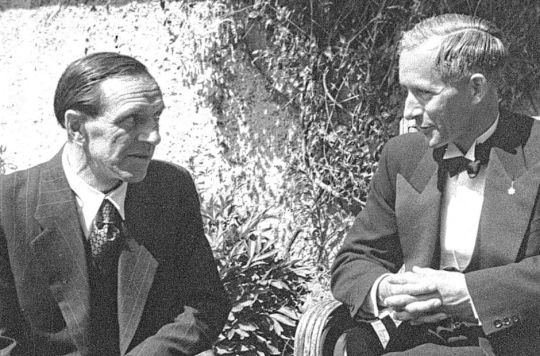
Back in the 30-s, Jünger had been observing the same developments not only in the Soviet Union and Germany but also in democratic France and Great Britain. He called this process "total mobilization" which is carried out by means of technology. And, Jünger went on to say, since the information component was growingly significant in modern wars, the states not only secretly engaged in race of arms but also had been enhancing the spheres which helped to make a society more homogeneous and uniform: sports, cinematograph, press, as a means of propaganda in particular.
Jünger traced the origins of this process back to the Napoleonic wars, which for the first time dissoluted the borderline between the lacking military and the civilians. The declining warrior estate, the last bastion of aristocracy, eventually collapsed during the WW1 due to its groundbreakingly industrial character. The soldier behind the artillery battery no longer needs to be honorable, strong or clever. He needs to be professional, that's all. The very basis for heroism breaks down. Warriors turn into workers who often don't even have an experience of direct contact with the enemy. Jünger makes it clear that heroic realism is the only attitude which is worthy of cultivating under altered conditions, and precisely stoical acceptance of the latter is what makes such an attitude "heroic."
Jünger, who occupies a very special place among the theorists of philosophy of technology, heuristically associated the latter with the mythological forces of titanism. He and his brother Friedrich Georg described in detail what it means, and their mythological and poetic metaphors, in my opinion, have a huge descriptive and explanatory value.
In terms of Ernst Jünger's philosophy of culture, the titans, chthonic creatures, rebel against the gods, Olympians, by destroying the established borders between their creations, including Oswald Spengler's creatures (beings) of the higher type: cultural-civilizational types, let alone nations, nation states and races. The only difference between the interwar and the post-war spiritual-historical situation is that the advent of industrial orders bore the mark of titan Prometheus, homo faber, basically, the principle of productivity and a merciless rational warfare, whereas the post-industrial society loses heroic voluntarism of Prometheus (who, after all, remained on the side of the gods), because now the titans have a more powerful ally: Gaia, Mother Earth herself revolting against Heaven-Uranus.
The invention of the lightening rod defending earth from heavenly fire in 1752, according to Jünger, was one of the starting points of this process. Today, Gaia covers herself with an ever denser network of cables, the true kingdom of titans producing their own fire and energies, which replaced earlier industrial gigantism. Along with the erosion of godly archetypes, species of animals and plants, flourishes genetic engineering challenging natural divine designs, as well as artificial insemination as the most obvious manifestation of the matriarchal orders’ expansion. All kinds of borders, limitations and inequality are treated with extreme irritation. Everything becomes fluid like early shape-changing sea-god Proteus, one of the enemies of Hercules, who sided with the gods against the chthonic creatures.
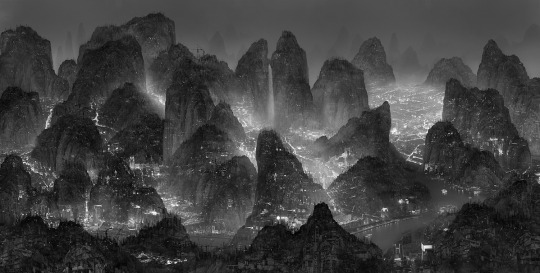
Actually, we have already heard similar ideas in this or that form, for example, Julius Evola’s take on the “gynecocratic” society, but the important difference is that Jünger describes these tendencies in neutral objective terms, firstly, because the titans also have their legitimate place in the mythological structure of the universe and resonate with some aspects of a human psyche, secondly, these tendencies are not eternal. In this respect, Jünger, like Nietzsche, was a true visionary.
For the shipwreck of Titanic, in Jünger's interpretation, was another powerful sign sent by Cassandra indicating that the reign of the titans would also soon come to an end. At the same time, it is not a matter of sequential cycles of the divine and titanic rules. According to Jünger's forecast, the titans will reign throughout the entire 21th century, but then the gods will return, casting the titans in the Tartarus again, but also completing the eventual decline of the anthropocentric history which began with WW1 as the gates through which the titans entered the historical scene. Anti-individualistic, anti-human, misanthropic totalitarian orders, in Jünger's words, are a natural outcome of a much more global metaphysical dynamics: man's giving way to the titans on the historical arena.
However, early Jünger welcomed this process as the active-nihilistical phase of Friedrich Nietzsche's transvaluation of all values which must end with the birth of new values. Superman is the conqueror of God and nothing, says Nietzsche meaning that it is about creative ruination, but also giving a hint that Nothing may be an enemy much more terrific than the old order and values.
That's why early Jünger neutralized Marxist economical reductionism by reinterpreting the Worker not as a worker estate or a proletarian class but as a new human type which is as if engraved, as if imprinted in the human material by the metaphysical and, should be added, titanical Gestalt of the Worker. The new human type assumes the features of technology: activity, dynamism, impersonality and a passion for uniform ways of behaviour. Jünger calls it the principle of work carefully distinguishing it from the moral Biblical merits of hard labours. And he welcomes the new human type replacing the "touching child of the bourgeois sentimentality," the individual. In this context, Jünger also attacks the freedom of speech and fake artistic expression.
Simultaneously, the new human type is not so much totalitarian as “superhuman”: according to Jünger, this is the new aristocracy born in the trenches of WW1. Anyway, we easily recognize the polemic with “I accuse,” Emil Zola's letter to the president of French Republic in defense of Alfred Dreyfus, Jewish officer who was charged with state treason and was also condemned by the patriotic public. Since then, criticism of the state, bureaucracy and official media from a civic point of view has been associated exclusively with the Left.
However, having received a ban on publishing in the British occupation zone right after the end of WW2 and, overall, experiencing total control in the post-war FRG, Jünger, soon enough, developed his own extremely influential third positionist criticism of the police state. Following his friend Carl Schmitt, he labeled the neo-totalitarian political system “Leviathan” and started summoning gods back. Shortly afterwards, Jünger was reintegrated into the post-war German society as a writer, participated in the German-French reconciliation ceremony in 1984 alongside German chancellor Helmut Kohl and French president Francois Mitterand and, eventually, has become a true cultural icon in Germany and beyond, but his criticism has remained unchanged.
As opposed to the interwar emphasis on the new human type, Jünger started stressing individual strategies of resisting Leviathan. Jünger documents this change of perspective in works like "Across the Line" (1950), "The Forest Passage" (1951), as well as later collection of aphorisms named "Author and Authorship" (1984). As opposed to his early attack on fake political and artistic freedom, this time, Jünger places poets and artists among other figures hated by the tyrants: the followers of religious and metaphysical teachings who don't fear death but whom the tyrants fear, friends and lovers who do not let Leviathan dissolute the personal in the public. Almost liberal ideas, as far as we see, but they are well-familiar to us in the context of discussing the model of a state within a state, the oasis in the desert of post-war nihilism, as Jünger defines this space of personal freedom. For the elephant skin of the titans still suffers from artistic stings of the muses, Jünger adds.
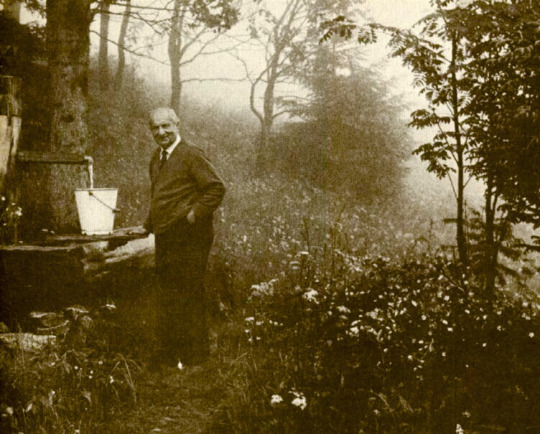
To sum up, Jünger suggests the models of a sovereign individual, first Waldgänger (the Forest Fleer), then the Anarch as the advanced version of the latter. The metaphor of the Forest and hidden forest paths leading to freedom becomes crucial for the post-war Third Way, especially in Jünger’s and Heidegger’s work. Many recognize here a reference to Tacitus’ “Germania,” and Jünger himself referred to the old Icelandic right to retreat into the forest for those who were proclaimed outlaws. In many respects, these models are as polemical with regard to the liberal (bourgeois) concept of freedom as the new human type exemplified in the Warrior and the Worker. But, as opposed to the latter, the Forest Fleer and the Anarch target not the old discredited order but Nothing itself, Nothing that not so much replaced it in all its outright omnipresence as found its way into the very heart of the new post-war order, seemingly humanist and freedom-loving.
Actually, already in 1949 futuristic dystopian novel “Heliopolis” Jünger showed that technological development wouldn't bring liberation and equality. He illustrates it in the episode about the device named phonophor, an analogue of modern smartphones with an access to the Internet, which unveiled the old deception of indirect democracy. Although all residents of Heliopolis could participate daily in internet plebiscites and questionnaires, answer “yes,” “no,” “abstain,” the right to pose questions for voting, as always, belonged to the few. Today, in the epoch of audio-visual technologies, the dystopian aspect of technology in the service of a particular political agenda consists in the filtered informational, especially online, exchange with a society: anytime, a political opponent can be announced an “extremist” and deprived of such access.
The Orwellian genre of the futuristic dystopian novel has become very symptomatic for late Jünger. 1977 novel “Eumeswil,” which is a sequel to “Heliopolis,” is a key parody of the modern society in which Jünger, conceptually, continues developing the main theme of “The Forest Passage”: liberalism has nothing to do with freedom. The main difference between the two models of a sovereign individual described in these works is that the society expelled the Forest Fleer, whereas the Anarch expelled the society from himself; as famous Jünger’s formula says, the Anarch is to the anarchist, what the monarch is to the monarchist.
A protagonist of the Anarch in the novel, historian Martin “Manuel” Venator, is also employed as a night steward at the Casbah, a fortress of Condor, the tyrant ruling over the futuristic city state Eumeswil somewhere in North Africa. As a sovereign individual, he is no enthusiastic supporter of Condor and, theoretically, could even assassinate him, but the self-stylized Anarch is even more distanced from the “opposition” in the person of advocates of what he believes to be fake freedom: anarchists “raging until they are thrust into a more rigorous straitjacket,” liberals, demagogic socialists imagining themselves the followers of Brutus. As opposed to them, the Anarch rejects not the state and power structures as such; he rejects the very foundations of the contemporary society, because, as a historian, he knows “what can be offered” (“I am an anarch – not because I despise authority, but because I need it”).
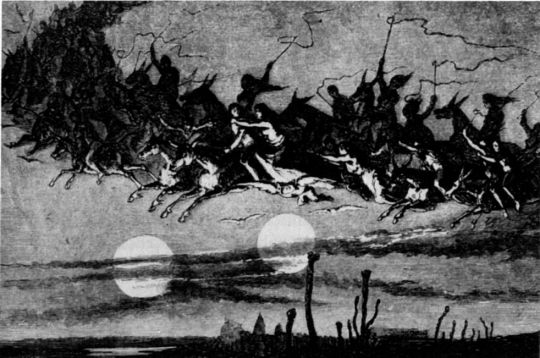
Interestingly enough, in tune with late Jünger’s frequent motif of “The Great Transition,” “Eumeswil” ends with the Great Hunt in the jungle in which participate both the narrator, Martin Venator (meaning “hunter”), and tyrant Condor. Nobody returns from this highly metaphorical “Forest Passage,” and this final conjunction of the Anarch and the tyrant, just like Jünger’s conscious collision of freedom vs. “freedom,” functions as a positive counterpart of today’s anarcho-tyranny.
In other words, the Anarch rejects only the regime of anarcho-tyranny comprised of delusional freedom and no less fake and illegitimate authorities. And we, third positionists, in no way attack freedom while attacking neo-liberalism: we attack neo-totalitarian despotism of quasi-Eastern type which currently reigns in the old West maniacally hunting thought crimes of the dissidents.
Actually, it was Oswald Spengler who for the first time clarified that the late phase of the European cultural and civilizational type, the Faustian phase, is indifferent to arts, poetry and, overall, culture. It cares about science, technology, industry, construction (not architecture as such), spatial expansion and quantitative growth in general. Spengler called it the late civilizational phase when the culture's creativity is already exhausted. Jünger reinterpreted it as the contrast between the divine and titanic reigns. Similar ideas may be found in the creativity of Rene Guenon, the founder of integral traditionalism, “The Reign of Quantity and the Signs of the Times” (1945) in particular. When the cannons sing, muses are silent, reiterated back in the days Nietzsche.
That's why, on a global scale, as pompous and surreal as it may sound, we will feel a relief only when we hasten the coming of a new metahistorical aeon. When the gods return, culture, intelligence and argumentation become important again. Yet, the very idea of expansion and voluntaristic hastening of higher cycles is titanic, Promethean, and that is also why I refer to Jünger's principled belief that man should be friends both with the gods and the titans, for he has elements of both of them.
The main lesson drawn by Jünger from WW2 was that the new orders did not bring new values and can easily coexist with nihilism. However, the reverse is also true: the Forest can grow bigger from any point of the existing titanic infrastructure, for, as Jünger persuasively shown, it is not “evil,” it’s neutral. Technology, as a mythical power, of course, is neutral not in a sense of being a mere instrument of progress and equal distribution of material goods. Experience of two world wars says that technology, above all, is a destructive, levelling power. Still, it can work both ways, for Leviathan and for the Forest, for the global state and for the rebel who does not need the mediation of the latter while addressing the society. That’s why the global political system fears popular metapolitical video bloggers so much: they defeat the modern world with its own weapons.
As Carl Schmitt observed, modern Partisan, thanks to new technological means, becomes mobile and rootless, which makes him especially dangerous for the system. Schmitt provided probably the deepest philosophical-political account of anarcho-tyranny: the global police state which denies the normal notion of the enemy, and, having demonized all opponents as enemies of humanity as such (not some contingent and particular regime like the modern Western political system), legitimizes its neo-totalitarian oppression through repeated counter-terror operations against all disagreeing. Today it happens, above all, by importing representatives of incompatible cultural values into Western societies and criminalizing the popular frustration. But certain geopolitical alternative, inspired by the modernity itself, will make the system armless.
Not incidentally, Jünger, during his stay in Paris as part of the German occupation administration, wrote a secret treatise “Peace” in which he suggested a model of the United States of Europe. Learning from Trotskyist internationals, Jünger called to develop universalism from the Right instead of reactionary, and futile, resistance to this world-historical tendency. Today, when I say that the model of a state in a state is insufficient or, more precisely, intermediate, and refer to paneuropean geopolitical doctrines and a planetary geostrategy, I mean creation of the infrastructure for the universalism from the Right within which we will be able to expand (“titanically”) without compromising our values (the “divine”).
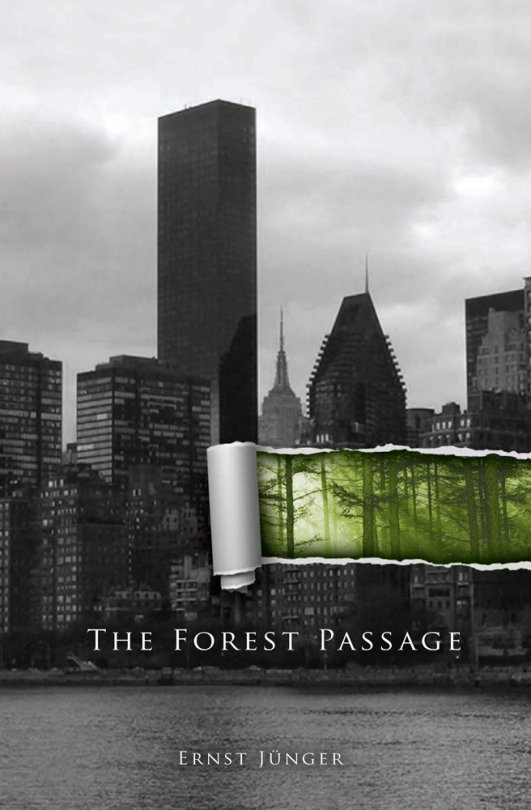
Fear of the system when it saw that networking of Alt-Right brought Donald Trump to power was enormous, although he’s a part of it. However, shutting down the public space for too many dissidents will cost too much for the system. We have to strongly "inject freedom" in the information space, in the artistic sphere as well, instead of letting it associate us with real terror acts, which, also after the 11th of September and Iraq, are used only for imposing more control on the individual, even apolitical. It does not mean that we cannot show teeth: there is enough crime, violence and injustice in the world entitling us, especially in Eastern Europe, to self-organize and claim first civic, then political, and, finally, geopolitical power to ourselves.
But the main battle lies in the individual’s relation to technology as both an alienating and a bonding power, both an instrument of dystopian totalitarian control or propaganda and an emancipating energy that does not recognize any limitations, intimately reaching people’s minds and souls like modern music and cinematograph.
In this respect, the situations in Western and Eastern European parts of the world are equal. We have to make a careful mapping of the public space to mark the territories in which the Forest can sprout out as the mythical vines of Dionysus. Illuminating social interaction, true art, liberating metaphysical teachings and practices, combined with our own geoeconomical projects, will bring down the regime of anarcho-tyranny in the blink of an eye.
#Scandza Forum#Fróði Midjord#Sweden#Olena Semenyaka#National Corps#Ukraine#Scandinavia#Anarcho-Tyranny#Ernst Jünger
0 notes
Photo
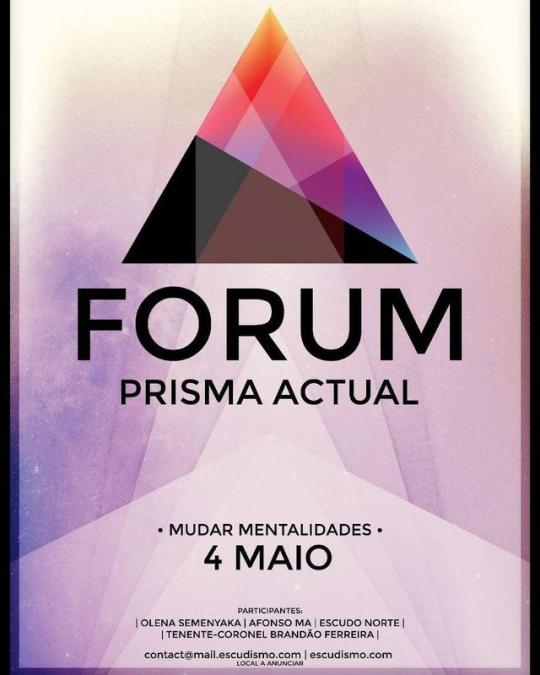
Welcome to Fórum Prisma Actual in Portugal!
From East to West, from North to South! May 4, Portuguese identitarian organization "Escudo Identitàrio" will host an international conference which will be also attended by Olena Semenyaka on behalf of National Corps, Ukraine.
There have always been warm relations between Ukraine and Portugal which has quite a numerous Ukrainian diaspora.
When the conflict in East Ukraine broke out, the paneuropean Reconquista Movement was established in Kyiv to support the Ukrainian struggle for identity and independence.
Today, we are happy to receive the invitation of this glorious country, the homeland of European conquistadors, and strengthen cultural and geopolitical ties with Portugal and Southern Europe.
#Fórum Prisma Actual#Escudo Identitàrio#Portugal#National Corps#Ukraine#Olena Semenyaka#Reconquista Movement#Lisbon
0 notes
Photo
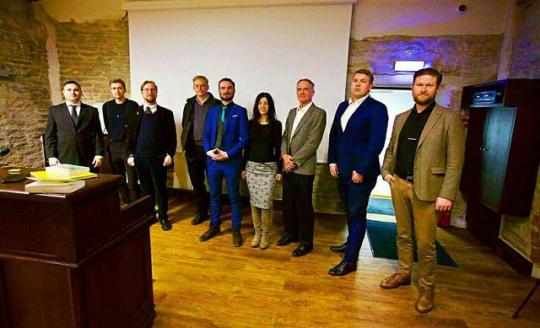
National Corps attended Etnofutur III conference in Tallinn (Conference Report)
February 23, National Corps took part in the Etnofutur III conference in Tallinn, which is for the third year in a row hosted by the youth organization of Estonian People's Conservative Party (EKRE), Blue Awakening (Sinine Äratus).
Under the skillfull leadership of Ruuben Kaalep, Tartu City Council member and the head of EKRE's Foreign Affairs office, it has become a rare point of attraction for renowned speakers from all over the world.
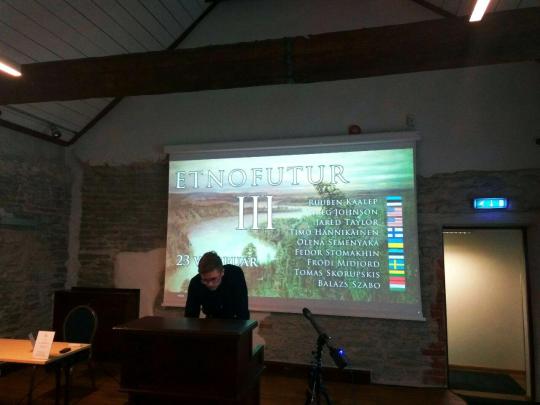
Traditionally, the strong emphasis has been laid on the conceptual synergy of the nationalist speakers of the Intermarium region. Once again, representatives of Sinine Äratus confirmed their substantive philosophical background which earned them international fame.
Ruuben Kaalep guarded the listeners through the existential journey paralleled with the new dawn in the fate of Europe, not forgetting to mention Martin Heidegger's diagnosis of the origins of decline, when identification with acts of thinking replaced openness to Being. Fedor Stomakhin presented a captivating piece on the strategies to neutralize and take the advantage of the leftist tendency in the established democratic procedures and the global marketing system. Co-written with another member of Sinine Äratus, Remi Sebastian Kits, it was their yet another profound contribution to the development of the conception of ethnofuturism.
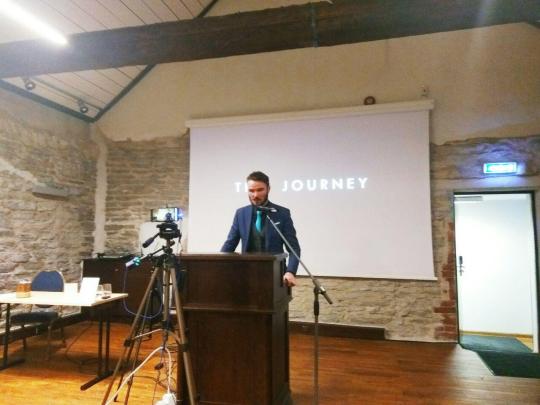
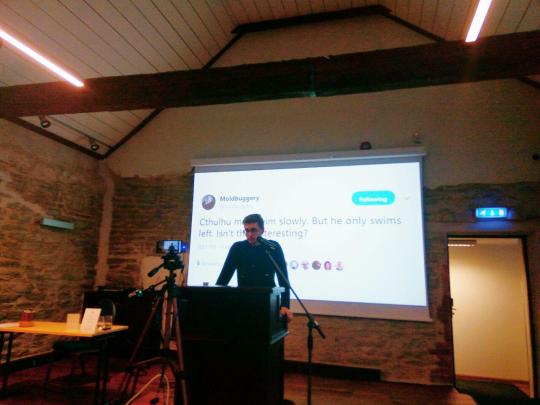
Success of Sinine Äratus is proven by the fact that another regular participant of Etnofutur conferences and a big enthusiast of Intermarium from Lithuania, Tomas Skorupskis, relaunched the youth wing of the Lithuanian Nationalist Union as the new ethnofuturist organization named Kryptis. Feb. 15-16, representative of National Corps Eugene Vriadnyk attended the Prabudimas conference and the massive torchlight march in honor of Lithuania's independence which were organized by Kryptis.
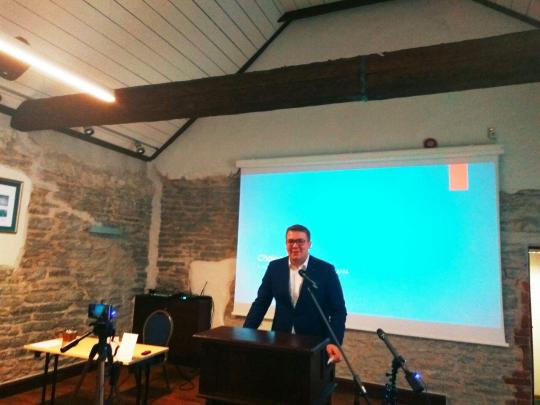
Olena Semenyaka, international secretary of National Corps and coordinator of the Intermarium Support Group, also continued elaborating the titular for this conference cycle conception in a speech entitled "Middle Europe in the Age of Caesarism and the Purpose of Ethnofuturism."
The brightest example of ethnofuturism as a combination of the policy of protecting ethno-cultural identities with innovative technologies, in her opinion, is the Azov Movement, which has long transcended the narrow party format. Dozens of social projects, educational programs, highly professional military structures, that's how should look like an all-Ukrainian patriotic movement of the 21st century which is well-prepared for the hybrid challenges of our time.

Having illustrated Oswald Spengler's concept of caesarism (the final period of the historic cycle of the West which began with the first world war) by the modern phenomenon of right-wing populism accompanied by military might, Olena Semenyaka presented Intermarium as the space where Old Europe can return to life again entering a new cultural and civilizational turn. Besides, she highlighted Ernst Jünger's philosophy of history efficiently incorporating, and neutralizing, the aforementioned left-leaning world-historical tendency.
Apart from developing the concept of ethnofuturism, which has strategic significance for the establishment of a regional union, National Corps came to Tallinn also in order to support a friendly organization on the eve of the parliamentary election in which EKRE will take part this weekend. According to exit polls, EKRE can count on 20 percent of electoral sympathies.
However, Estonia is not only a vanguard of the Baltic ethnofuturist studies. As a member of the Finno-Ugric ethnolinguistical family, Estonians are well-known for friendly ties with the Finns and the Hungarians, which makes their role in the consolidation of the Intermarium cooperation especially important.
Not incidentally, Etnofutur III conference was opened by MP Balazs Szabo representing quite famous in the international field Hungarian party Jobbik. Still, not everyone knows that Jobbik took a slightly different political course, and, currently, this is the biggest opposition party in Hungary. The reason is simple but valid enough to push Jobbik towards the temporary tactical alliance with the leftists: Balazs Szabo described Victor Orban's regime as the epitome of corruption and the right-populist illusion of real changes.
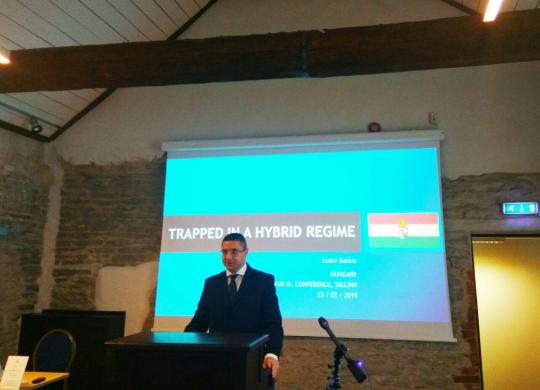
During and after the conference, Olena Semenyaka discussed with the Hungarian delegation the ways to neutralize the interethnic conflict in Transcarpathia, as well as to promote the natural for the region Intermarium union in Hungary.
On the eve of the Awakening conference in Finland, a long-anticipated agreement about the promotion of the Intermarium union was also reached with the Finnish conference participants. Timo Hännikäinen, a remarkable Finnish intellectual, publisher, editor-in-chief of the online magazine "Sarastus," leaved no doubts about the historical and cultural affinity between Ukraine and Finland in his inspiring speech at Etnofutur III conference in Tallinn, which laid a special emphasis on Carl Schmitt's concept of the political resting on the existential division between "us" and "them."
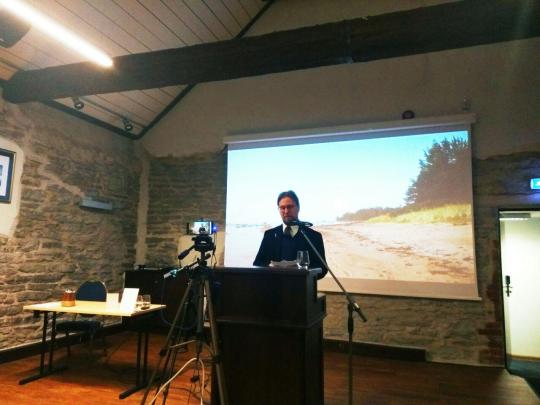
Currently, Ukrainian Intermarium Support Group plans in-depth familiarizing of the Finnish audience with the geopolitical project of Intermarium jointly with the youth organization of The Finns Party and the Finnish identitarian organization Suomen Sisu.
Froði Midjord (The Faroe Islands / Sweden), host of the Guide to Kulchur podcast and the founder of Scandza Forum, which, among others, will be attended by Olena Semenyaka in the end of March, brilliantly showed the absurdity of the unconscious hope of some activists on the Right to invoke sympathy of the political enemies by victimizing themselves and proving how good their real intentions are. The summary of his speech may be found here: https://www.counter-currents.com/2019/02/the-will-to-politics/
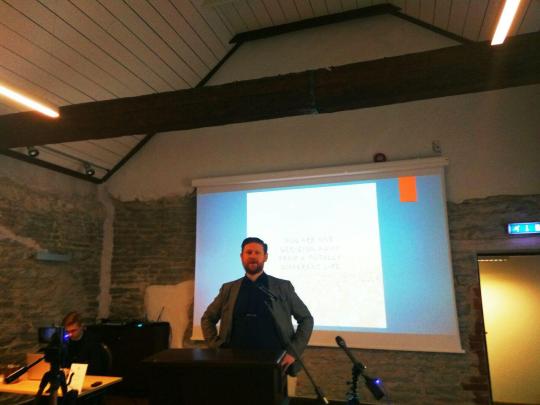
But Sinine Äratus is also well-known for their close ties with the Anglophone world and the American Alt-Right. Last year, it was represented by famous Scottish videoblogger Millennial Woes. This year, American "heavy artillery," Jared Taylor and Greg Johnson, carried away the audience by their flawless speeches, the former diagnosing the multicultural disorder of the Western sociocultural psyche, and the latter complementing it with quite a cheering reflection about the rise of national populism in the United States and Europe. Cheering for the nationalists and identitarians all over the world, upsetting for the globalists: at that very time, Greg Johnson's "Manifesto of White Nationalism" was banned from Amazon.

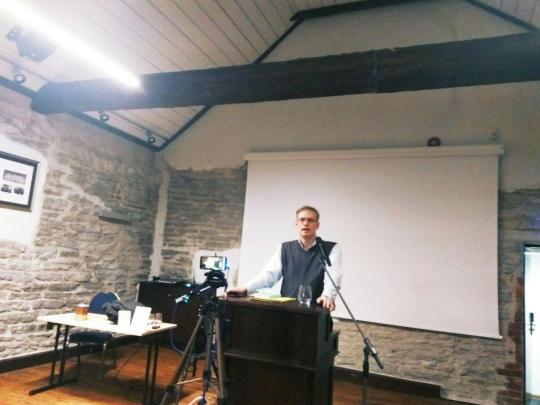
The conference was attended by more than 100 guests from Estonia and other European and American countries. The biggest interest to the project of Intermarium was naturally demonstrated by the representatives of the region's countries. However, Olena Semenyaka also had an fruitful conversation with the youth organization of the Italian party Lega, which, since recently, has been paying a growing attention to the political trends of Central and Eastern Europe and is preparing to form a powerful coalition in the European Parliament.
Having participated in organized by EKRE more than 10,000-strong torchlight march in honor of Estonia's independence across the beautiful medieval streets of Tallinn together with Latvian, Swedish, Lithuanian, Hungarian, Finnish, American, English and Canadian conference participants, Olena Semenyaka completed an intense and productive visit to Estonia by recording several video interviews for the Finnish and American media, as well as invited EKRE and the Etnofutur conference participants to the Fourth Conference of the Intermarium Support Group.
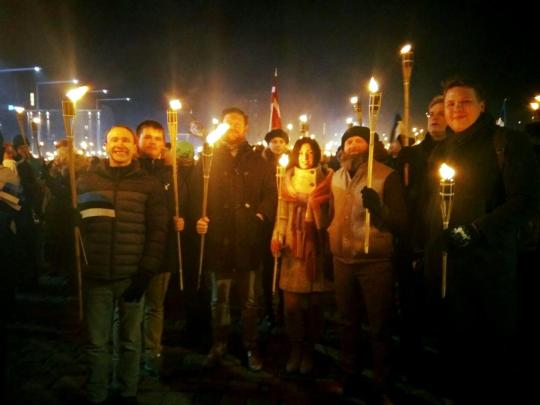
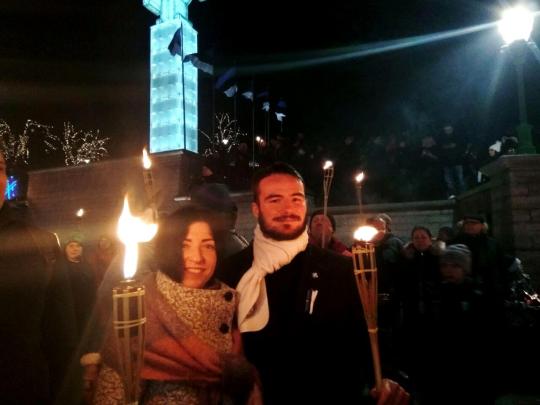
#Etnofutur#Sinine Aratus#EKRE#Estonia#Intermarium#National Corps#Ruuben Kaalep#Olena Semenyaka#AZOV movement
1 note
·
View note
Photo
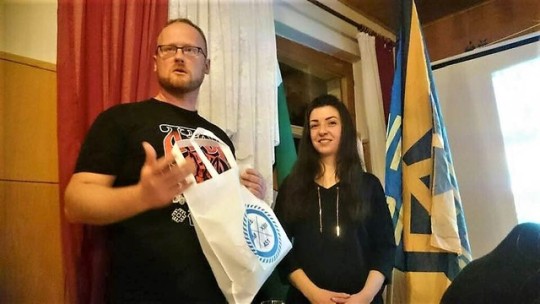
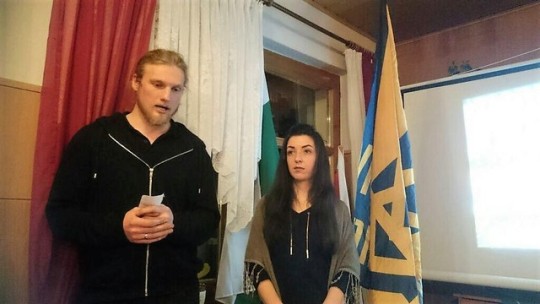
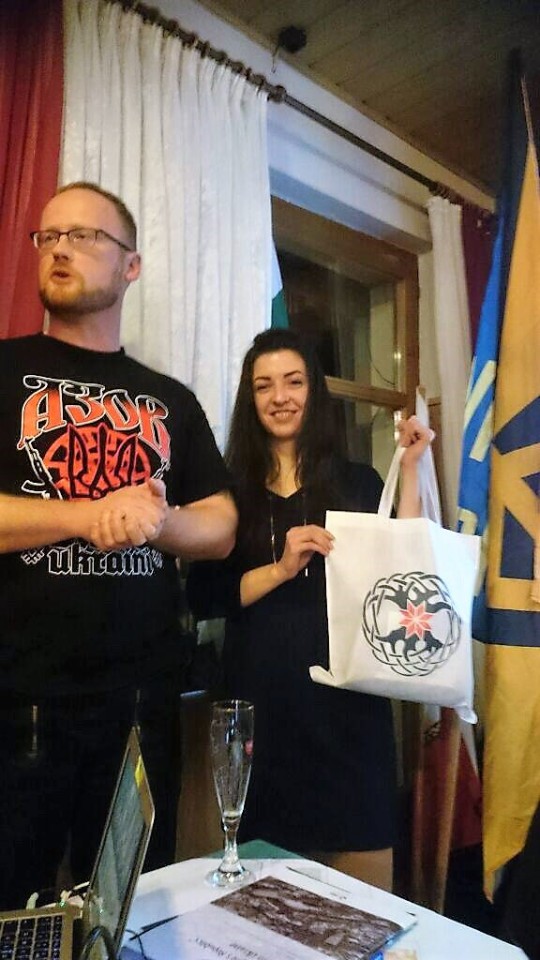
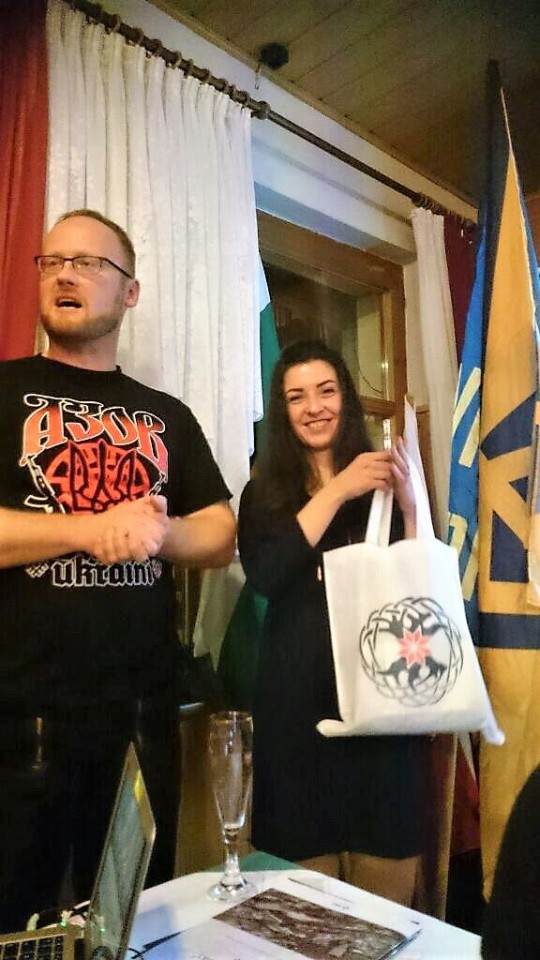
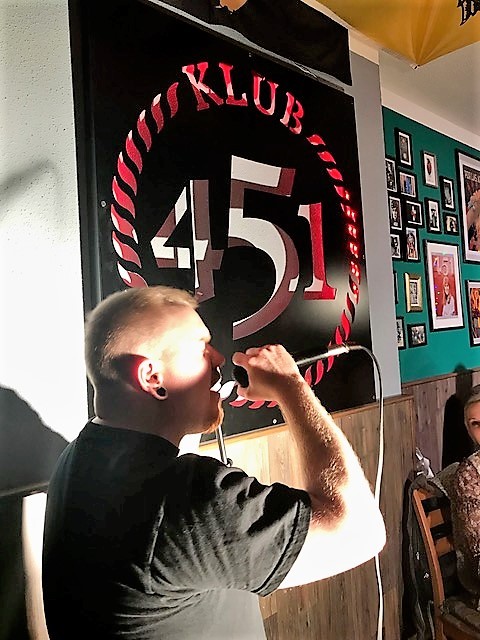
"The Evolution of the Azov Movement" at the event of NPD in Saxon Switzerland
Feb. 16, the activists of the Kraftquell project and the department of NPD in Saxon Switzerland hosted a unique event in this beautiful German land dedicated to the evolution of the rapidly growing Ukrainian Azov Movement.
The lecturer was Olena Semenyaka, International Secretary of National Corps, the parliamentary wing of the Azov Movement. Her speech was supported by video presentations and translated to German with a detailed background information for the local audience. The vivid interest of the listeners was manifested during the questions part of the event. What is remarkable, not only youth was present at the meeting, and the older German generation showed a rare knowledge of the Ukrainian history and state building.
Olena Semenyaka highlighted the origins of the Azov Movement as the Ukrainian nationalist organization of the new generation named The Patriot of Ukraine, which emerged in the Eastern Ukrainian city of Kharkiv and, since its very inception, had a mature paneuropean thinking, as well as regularly conducted paramilitary training. When the Maidan Revolution broke out, members of The Patriot of Ukraine were well-prepared to fight the police, first within the broad national-revoutionary movement of Right Sector, then, after their unalterable leader Andriy Biletsky was released from prison, as the newborn Azov Movement.
Following the path from the war to politics, they formed the Black Corps comprised of the "little black men" as a response to anonymous Russian "little green men" without insignia who annexed Crimea during the so-called democratic referendum on its future fate. The Black Corps operated in Eastern Ukraine, and its first most successful operation was the liberation of half a million city of Mariupol, the second biggest city in the region after Donetsk.
At that time, it has already been the Azov Battalion, the only Ukrainian volunteer battalion which has been converted shortly afterwards into the regiment of the National Guard of Ukraine. If the authorities had provided minimal support for the unit, it would have entered Donetsk, and the only successful counter-offensive operation throughout the entire course of the conflict under conditions of Minsk peace agreements was conducted precisely by the Azov Regiment, namely the release of Shyrokyne.
The logic of the Azov Movement's unfolding was as follows: the Azov Civil Corps, the National Corps party, the paramilitary structure of National Militia, and over 30 projects functioning as independent NGOs, from the education and metapolitics to sport and youth camps.
But the most challenging projects of the Azov Movement, which is well-prepared for the hybrid scenario both at war and in politics, are the geopolitical ones. Olena Semenyaka emphasized that the Intermarium (Adriatic-Baltic-Black Sea) defense union as a platform for the alternative to the EU sovereign Paneuropean union is the main geopolitical program of National Corps. In this context, she referred to the German doctrines of Mitteleuropa, as well as made it clear that National Corps considers Ukraine an heir of the continental mission of "the heart of Europe," Germany, in times of the "iron chancellor" Otto von Bismarck. In turn, the Azov Movement, in her opinion, heavily reminds of the German Freikorps caught between two fires: on the one hand, the Bolshevik invasion in Germany and Baltics, on the other hand, the treacherous Weimar government.
However, Olena Semenyaka concluded to say, precisely the false rivalry of the West and the Russian Federation creates the unique chance for the intended "buffer zone," Eastern Europe, to become the center of the restoration of the all-European geopolitical subjectivity and superpower. After the majority of Russian nationalists fled to Ukraine due to severe "anti-extremist legislation," multicultural agenda and "Nazi" witch hunt in Putin's Russia, it has become obvious that only Eastern and Central Europe, especially Ukraine, remains the space of political freedom and the springboard for ambitious geopolitical projects.
The host of the event was the initiator of the Kraftquell project Thomas Rackow who seized the opportunity to announce the opening of this German-Ukrainian-Norwegian project in Germany. The goal of this, in fact, charity project is to organize a vacation in Germany and Norway for some Ukrainian veteran families and thus to show the European family of peoples in action. In the end of the lecture, Olena Semenyaka received a package of production promoting the Kraftquell project which was made with the support of the excellent metapolitical center in Pirna, Haus Montag, which is coordinated by Thomas Sattelberg.
The event was closed with a fantastic live performance by Phil of FLAK, a famous German RAC band, which, according to the fair observation of the frontman, has long transcended the genre in terms of the scope of the ideological response and the suggested positive alternative. Apart from the classic FLAK in German, he performed the composition in English which was dedicated to the paneuropean solidarity of European nations.
The participants of the meeting eagerly made further cooperation plans for the observable future, which, apart from the Kraftquell project, includes the publishing initiatives and joint international events.
#Pirna#NPD#Haus Montag#Thomas Rackow#Kraftquell#Thomas Sattelberg#NPD Sachsen#Olena Semenyaka#Azov Movement#National Corps#Andriy Biletsky#Intermarium#Mitteleuropa#Paneuropa#FLAK
0 notes
Video
youtube
Scandza Forum Highlights (Stockholm, March 30)
Fróði Midjord (also reciting the speech by Jared Taylor), Marcus Follin (The Golden One), Greg Johnson, Millennial Woes, Mark Collett and Olena Semenyaka.
Video of the speech by The Golden One:
youtube
Video of the speech by Greg Johnson:
youtube
Text of the speech by Olena Semenyaka: https://interregnum-intermarium.tumblr.com/post/184204005299/growing-a-forest-in-a-world-state-ernst-j%C3%BCnger-on
#Scandza Forum#Fróði Midjord#marcus follin#The golden one#mark collett#millennial woes#greg johnson#Olena Semenyaka#stockholm#sweden
0 notes
Photo

Olena Semenyaka "Wotan, Pan, Dionysus: at the gates of the Grand European Solstice" (VIDEO)
Pre-Pact of Steel III (Dec. 14, 2018) conference highlights
Olena Semenyaka (philosopher, Reconquista, Ukraine) "Wotan, Pan, Dionysus: at the gates of the Grand European Solstice." Speech at ASGARDSREI-VI post-festival Pact of Steel II conference "After the Darkest European Hour" (Kyiv, Dec. 17, 2017)
Олена Семеняка (філософ, Reconquista, Україна) «Вотан, Пан, Діоніс: напередодні великого європейського сонцевороту». Виступ на конференції Сталевий Пакт ІІ (Київ, 17 грудня 2017 р.) по слідах фестивалю АСГАРДУ РЕЙД-VI
Елена Семеняка (Реконкиста, Украина) «Вотан, Пан, Дионис: в преддверии большого европейского солнцеворота». Доклад на конференции Стальной Пакт II «После темнейшей европейской ночи» (Киев, 17 декабря 2017 г.) по следам фестиваля АСГАРДА РЕЙД-VI
youtube
#olena semenyaka#елена семеняка#Олена Семеняка#pact of steel#сталевий пакт#стальной пакт#asgardsrei#wotan#pan#dionysus#black metal#reconquista
0 notes
Text
Austrian Academic Institute Revokes Fellowship Provided to Far-Right Figurehead
Austrian Academic Institute Revokes Fellowship Provided to Far-Right Figurehead
Olena Semenyaka. Photo: YouTube
An Austrian academic institute has revoked a fellowship to some Ukrainian postgraduate following the embarrassing discovery that they would be a key figurehead within the global far-right.
The Vienna-based Institute for Human Sciences (Institut für die Wissenschaften vom Menschen, or IWM) stated Monday the fellowship awarded to Olena Semenyaka, the mind of…
View On WordPress
0 notes
Photo

Compte-rendu de la 2ème conférence Paneuropa (Kyiv, octobre 2018)
La deuxième conférence Paneuropa s’est tenue à Kyiv, capitale de l’Ukraine, le lundi 15 octobre 2018 dans le cadre de la semaine paneuropéenne, au club Reconquista, sous l’égide du réseau européen Reconquista.
Des participants venus d’Italie, d’Allemagne, de Norvège, ainsi que des représentants des forces nationalistes ukrainiennes y ont pris part, rejoints par des invités de marque venus de Suède (Marcus Follin, « The Golden One ») et des Etats-Unis (Greg Johnson).
En outre, le Centre Russe de Kyiv et les Grecs de ProPatria ont exprimé leur soutien aux initiatives et aux projets des nationalistes ukrainiens.

L’arrière-plan conceptuel de l’événement
Aujourd’hui, dans le contexte mondial d’un tournant populiste de droite, il est devenu courant de déclarer « L’Italie (La Pologne, La Hongrie…) d’abord ! ».
Toutefois, lorsque le président de la première puissance mondiale admet qu’il est nationaliste, sans qu’il soit tenu compte de son véritable degré d’adhésion à cette notion classique, et proclame « Make America Great Again », cela traduit un phénomène bien différent de celui du retour aux états nations en Europe.
Il n’est pas suffisant pour les états européens pris individuellement, et même pour tous pris dans leur ensemble, de s’émanciper de l’Union Européenne et de fermer les frontières pour résoudre le problème de l’absence de l’Europe sur la carte du monde en tant que sujet géopolitique et surtout, comme un bloc civilisationnel et culturel spécifique.
Les superpuissances (Etats-Unis, Russie, Chine…) continueront à influer sur les tendances politiques et économiques mondiales en continuant à diviser l’Europe en zones d’influence.
Dans la mesure où l’Europe a de plus grandes ambitions que de demeurer le satellite de maîtres changeants, il est grand temps de s’unir et de proclamer comme nos principes « L’Europe d’abord ! » et « Rendre à nouveau sa grandeur à l’Europe ».
Par conséquent, l’objectif de cette de cette conférence internationale annuelle, est de nous réapproprier l’Europe en commençant avec le terme de Paneurope qui a été discrédité depuis des décennies par les multiculturalistes « paneuropéens » dans le sillage du comte Coudenhove-Kalergi.
En outre, puisque l’idée même des Etats-Unis d’Europe relève juste d’une analogie, la conférence Paneuropa vise à définir un voie équilibrée entre une fédéralisation excessive, qui au regard des dernières décennies est devenue synonyme de centralisation, et le petit étatisme.
La question connexe concernant le fait d’aller au-delà des réflexes chauvinistes est également régulièrement abordée lors des événements organisés par le mouvement Reconquista et il a été question cette fois-ci des tensions transfrontalières entre la Hongrie et l’Ukraine.
Un autre impératif de la pensée paneuropéenne tourne autour de la question des minorités nationales, du régionalisme et du droit des plus petites ethnies à l’autodétermination et se voit régulièrement abordé lors des conférences Paneuropa.
Un des exemples les plus éclairants de cette dernière, qui a récemment agité l’Europe, parmi d’autres, a été abordé au cours du premier forum Jungeuropa à Dresde et concerne la question catalane.
Le mouvement de la Reconquista européenne basé en Ukraine entretient des connexions avec les nationalistes espagnols qui ont attiré l’attention sur le fait que dans cette affaire l’identité catalane est mise en avant par les gauchistes désireux « d’enrichir » cette identité avec les soi-disant réfugiés non-européens.
En d’autres mots, il est impossible de parler d’identitarisme et de régionalisme avant que l’Europe ne se rétablisse en tant que sujet géopolitique. Les intrusions conjointes des forces mondialistes occidentales et russes pour établir un parallèle entre les velléités indépendantiste catalanes et la situation dans le Donbass ukrainien le prouvent fort bien.
Cela nous amène à un autre point d’une importance clé pour les nationalistes ukrainiens : l’impératif d’une troisième voie géopolitique entre un « protectorat » de la Fédération de Russie et une alternative similaire de la part du mondialisme occidental.
Cet impératif a été explicitement mis en avant par les représentants de toutes les forces nationalistes ukrainiennes ayant pris part à la conférence (Le Corps National, Svoboda, La Sitch Carpatique) et a été abordé en détail par la coordinatrice du Mouvement Reconquista, la secrétaire internationale du Corps National, Olena Semenyaka.
En opposition à l’idéologue du néo-eurasisme, Alexandre Douguine, nous réfutons l’idée que le monde moderne soit « unipolaire », ce qui constitue une prémisse à sa conclusion inutile soulignant la nécessité de succomber à la « contre-hégémonie » du Kremlin.
Si les Etats-Unis demeurent la puissance la plus influente, il est devenu évident pour les nationalistes ukrainiens, et pas seulement pour eux, qu’à la lumières des dernières années écoulées, l’Occident et la Fédération de Russie continuent à fragmenter l’Europe en zones sous leur contrôle comme l’Allemagne d’après-guerre. Et il n’est pas nécessaire d’expliquer qu’une Europe éclatée constitue l’exacte antithèse de l’idéal paneuropéen, quel que soit la nature des relations ou des frictions russo-ukrainiennes. L’Europe orientale ne cèdera jamais aux sirènes de Moscou.
D’ailleurs, le dilemme catalan est révélateur de ce qui se passe à l’échelon européen : il est impossible de parler d’Eurosibérie, ou d’un quelconque projet supra-européen, qu’il soit euro-atlantique ou eurasien, avant de restaurer la souveraineté politique de l’Europe et sa subjectivité géopolitique. Le choix fallacieux entre Occident et Russie est démontré par le simple fait qu’ils continuent tous deux à coopérer économiquement et à décider du sort de l’Ukraine, en dépit des sanctions économiques et des campagnes médiatiques menées respectivement contre les impérialismes « américain » et « russe ».
Un autre fait démontrant que l’Occident et la Fédération sont davantage des congénères rivaux et concurrents plutôt que des adversaires idéologiques renvoie à l’histoire qui est arrivée aux nationalistes russes de Kaliningrad, l’ancienne Königsberg.
Cette dernière fut, entre autres occasions, abordée lors du premier forum Jungeuropa, dans le contexte de la nécessité pour l’Europe de se libérer des bases militaires étrangères.
Au cours de la conférence inaugurale du Groupe de Soutien à l’Intermarium, qui s’est déroulée à Kyiv en juillet 2016, les représentants de l’organisation nationaliste russe BARS ont suggéré que Kaliningrad pourrait être réintégrée dans l’espace géopolitique de l’Intermarium, animé d’intentions amicales vis-à-vis de l’Allemagne. Bien qu’ayant exprimé leurs idées à titre privé au cours d’un événement organisé par une organisation non gouvernementale, ces nationalistes russes ont été emprisonnés à leur retour à Kaliningrad sous l’accusation de séparatisme et sont toujours sous les barreaux.
Actuellement, Kaliningrad est considérée comme une plateforme stratégique cruciale pour prendre le contrôle des états baltes dans laquelle la Russie a accru sa présence militaire depuis 2014 qui inclut le stationnement de missiles balistiques Iskander-M au rayon d’action supérieur à 400 km.
Apparemment, l’Occident préfère les bases militaires russes et les armes nucléaires à Kaliningrad au réarmement de l’Allemagne, comme pour l’Ukraine, avec leurs perspectives nationalistes réprimées depuis des lustres, parce que les élites de l’Ouest seront toujours capables de trouver un arrangement avec leur homologue russe néolibérale et multiethnique aux tendances conservatrices inoffensives et à la plus vaste communauté musulmane historique d’Europe.
Il est grand temps pour les forces nationalistes européennes qui considèrent sérieusement leur engagement pour les peuples de notre continent d’élaborer une stratégie pour restaurer la souveraineté de l’Europe en commençant par les capacités de défense, au lieu d’applaudir à une autre « victoire » de Poutine sur l’Occident.
D’autre part, la dévalorisation du mouvement nationaliste de masse ukrainien comme un « pion » présumé sur l’échiquier mondial dans le jeu de l’Occident inspiré par Zbignew Brzezinski est tout simplement impardonnable, non seulement en tant que signe de sénilité sous le travestissement d’un fatalisme géopolitique, mais comme un triste abaissement des ambitions politiques européennes. Elle est regrettable en tant qu’obstacle pour saisir l’unique, probablement la dernière chance pour l’Europe de se préserver elle-même dans une nouvelle forge de guerre. Comme nous l’enseigne l’histoire récente, toutes les tentatives honorables de restaurer la puissance continentale de l’Europe ont été menées dans un contexte de détresse révolutionnaire de de guerres « fratricides », que cela ait été l’âge d’or géopolitique de la période post-napoléonienne ou la course aux armements ayant précédé, puis succédé au premier conflit mondial.
Les tensions croissantes entre les superpuissances occidentales et de l’Est rendent nécessaire l’unification des forces nationalistes autour de la troisième voie géopolitique, en lieu et place d’un échappatoire, d’un scepticisme et d’un déterminisme mal informé affirmant que tous les efforts sont futiles.
Aussi, le mouvement Reconquista qui vise à édifier une confédération paneuropéenne de nations européennes souveraines, la Paneurope pour le dire simplement, s’appuie sur les positions classiques de la Troisième voie (autrement désignée troisième théorie politique) dans la veine de Julius Evola, Ernst Jünger, Pierre Drieu la Rochelle, Oswald Mosley et Dominique Venner, qui ont été discutées lors de la première conférence inaugurale Paneuropa s’étant tenue à Kyiv le 28 avril 2017.
Résumé des conférences
La seconde conférence Paneuropa peut être divisée en 5 sections principales :
L’introduction par les coordinateurs de Paneuropa, les conférences des représentants des organisations d’Europe occidentale (Italie, Norvège, Allemagne), les allocutions des invités de marque à l’événement (venus de Suède et des Etats-Unis), les propos des représentants des partis ukrainiens (Corps National, Svoboda , Sitch Carpatique), les présentations et argumentaires (Projet Kraftquell et Centre Russe de Kyiv).
Olena Semenyaka a souligné les fondements du Mouvement Reconquista et pourquoi celui-ci est justement né dans la Kyiv révolutionnaire.

Tout d’abord, elle a mis en évidence le fait que le régime déchu de l’ex- président Yanoukovytch n’était que partiellement pro-russe. Il serait plus indiqué de le définir comme dépourvu de de toute subjectivité géopolitique sur le mode typique d’un régime post-soviétique qui sert ceux qui paient le plus, et à cet égard, sa différence avec le régime actuel n’est qu’une question de degrés. Par exemple, on peut rappeler que l’accord d’association avec l’Union européenne fut initié par Yanoukovytch au même titre que la première Gay Pride ukrainienne, qui se déroula sous la protection des Berkout, forces spéciales de la police qui réprimeront la révolution du Maïdan quelques mois plus tard.
Dans un deuxième temps, Olena Semenyaka a souligné que, malgré l’annexion de la Crimée et l’invasion du Donbass par la Fédération de Russie, qui a profité du moment pendant lequel l’état ukrainien était paralysé, pour prévenir un Maïdan russe, les mouvements nationalistes ukrainiens n’auraient jamais atteint un tel stade de développement sans le déclenchement des hostilités avec la Russie. Pour la première fois depuis la Seconde guerre mondiale, les formations nationalistes ont réussi à créer leurs propres branches militaires, l’exemple le plus éclatant étant le régiment à destination spéciale Azov, intégré dans la Garde nationale ukrainienne. C’est pourquoi, elle a aussi fait un parallèle entre la situation dans l’Ukraine post-révolutionnaire et le dilemme des corps francs allemands des années 20 qui ont dû combattre la menace bolchevique en Allemagne et dans le Baltikum pendant que le gouvernement libéral étendait son pouvoir de nuisance à l’intérieur de l’Allemagne.
Cependant, dans un troisième temps, précisément en raison de la nécessité d’assurer la garde des frontières de l’Ukraine, et de ce fait de l’ensemble de l’Europe orientale, face à la guerre hybride déclenchée et menée par la Russie, le mouvement nationaliste ukrainien a obtenu la chance non seulement de défier les autorités libérales et de concourir pour le pouvoir en Ukraine, mais aussi d’initier le développement de l’Intermarium, l’union militaire et géopolitique des pays d’Europe centrale et orientale, en tant qu’alternative à l’Union Européenne et extension moderne de la classique troisième voie géopolitique continentale.
Les participants à la deuxième conférence Paneuropa qui ont également assisté le 13 octobre à Kyiv à la troisième édition de celle du Groupe de Soutien à L’Intermarium, fondé par Andriy Biletskyi, entre autres député du Parlement , leader du Corps National et premier commandant du régiment Azov, ont pu estimer l’état actuel de la coopération entre les pays de la région.
A ce moment précis, Olena Semenyaka a poursuivi sur la géostratégie de la Reconquista européenne : l’Intermarium conçu comme une plateforme ou un tremplin en vue d’une intégration européenne alternative.
Au regard des crises en cours dans l’Union Européenne (terrorisme islamique radical, invasion migratoire, Brexit…), une telle opportunité est désormais prise en compte pas seulement par les participants à des événements comme Paneuropa, mais aussi par des représentants officiels de gouvernements d’Europe centrale et orientale.
La nécessité objective d’une coopération dans le domaine de la défense entre les pays de la région après le déclenchement de la guerre hybride par la Russie a rendu l’intégration par l’Intermarium tout à fait réaliste. D’ailleurs, la conjoncture géopolitique actuelle en Europe et dans le monde est plutôt favorable : le groupe des quatre de Visegrad (V4) et l’Initiative des trois Mers (3S), soutenue par le président américain Trump, pourraient, en tant qu’initiatives autonomes au sein de l’Union Européenne, constituer une base de départ pour le futur bloc souverain de l’Intermarium dans ses dimensions géopolitiques et militaires. A son tour, il pourrait devenir l’axe d’une intégration européenne alternative (une plateforme pour la Paneurope).
De plus, Olena Semenyaka est revenue sur la situation idéologique et politique au sein de la fédération de Russie. Ayant admis l’existence d’un socle de valeurs conservatrices naturellement partagées par le peuple russe, qui, parmi d’autres choses, est hostile à la propagande LGBT, elle a expliqué qu’il est plus facile de les préserver dans les pays d’Europe orientale qui possèdent pour chacun d’entre eux leur propre « nation titulaire ». A l’opposée, la fédération de Russie est un état multiethnique et multireligieux avec une minorité musulmane historique considérable et une immigration de masse dans la partie russe du pays, venue des républiques non européennes de la Fédération et des pays voisins d’Asie centrale. Il n’est pas surprenant de constater l’existence en Russie d’une législation « anti-extrémiste » très stricte et chaque cas particulier « d’incitation à la haine interethnique, interraciale ou interreligieuse » est systématique jugé en faveur des protagonistes non-européens des incidents. Par voie de conséquence, il n’y a plus de mouvements ou de partis nationalistes dignes de ce nom en Russie. Après le commencement de la guerre contre l’Ukraine, qualifiée de contrée « néo-nazie » par les médias russes, le jour de la Victoire et la mythologie de la Grande guerre patriotique sont devenus plus que jamais les fondements de la narration publique et de l’identité collective en Russie. En conséquence, toutes les activités nationalistes peuvent facilement tomber dans la catégorie du « révisionnisme historique, du révisionnisme sur les conclusions de la Seconde guerre mondiale et de la glorification des collaborateurs des nazis », qui les rendent illégales. Il n’est pas surprenant de constater que la majorité des activistes nationalistes russes, en premier lieu ceux qui se sont déclarés contre l’invasion de l’Ukraine, se sont exilés dans ce dernier pays. En d’autres termes, seules des organisations nationalistes ignorantes ou corrompues, peuvent encore en Europe considérer la Russie de Poutine comme un allié stratégique.
A la fin de l’événement, cette conclusion a été reprise par Denis Vikhorev, coordinateur du Centre Russe (en exil), un de ces nationalistes qui a fui en Ukraine après le début de la répression contre lui et ses camarades qui s’étaient dressés contre la guerre avec Ukraine. Il a attiré l’attention de l’auditoire sur des faits parfaitement éloquents : les financements d’état constants versés au Parti Communiste de la Fédération de Russie (dissous en Ukraine après la Révolution), de la part du gouvernement russe le 14 octobre 2017 (le jour des défenseurs de la patrie en Ukraine) lors de la 19ème édition du Festival Mondial de la jeunesse et des étudiants communistes à Sotchi (comme il se doit dans une Russie quasi soviétique, après une rencontre avec les représentants d’une des plus grandes banques du pays, la Sberbank), ou le renvoi immédiat en 2011 du porte-parole du service fédéral des migrations, Konstantin Poltoranine, après que ce dernier ait fait une remarque sur son intérêt pour le futur de la race blanche, ses critiques de la politique migratoire de l’Union européenne et son souhait exprimé de faire venir des migrants d’origine slave plutôt que des ressortissants asiatiques…

En fait, Denis Vikhorev a fait directement écho à un des principaux messages d’Olena Semenyaka qui a argué que les eurosceptiques pro-Kremlin (le « Con-Intern », « l’Internationale conservatrice ») n’ont aucun avenir et a appelé les forces nationalistes européennes à se rallier à la géostratégie de la Reconquista, unie autour de l’union de l’Intermarium comme une alternative à l’UE. Son principal mot d’ordre était décliné comme suit : pendant que l’Occident et la Russie continuent de considérer l’Ukraine comme une aire de jeu pour leurs ambitions, les forces nationalistes européennes devraient unir leurs efforts avec le potentiel représenté par le mouvement nationaliste ukrainien et contribuer à transformer la « zone tampon » entre les superpuissances en une confédération souveraine de la Paneurope.
Le message d’Olena Semenyaka a été confirmé par Mykola Kravtchenko, bras droit du leader du Corps National, Andriy Biletskyi qui a pris part à la conférence pour rappeler notamment à l’auditoire qu’une force politique sérieuse et à l’œuvre derrière le projet de la Paneurope.
Il a souligné que le conflit entre l’Ukraine et la Russie n’est pas tant une tragédie qu’une opportunité, une fenêtre de tir, pour l’Ukraine et l’ensemble de l’Europe, et que cette chance historique unique ne doit pas être gaspillée. Actuellement, le Mouvement Reconquista se compose de ramifications variées et réalise son objectif au moyen d’activités de réseau coordonnées pour aboutir au final à une confédération paneuropéenne de nations libres. Mykola Kravtchenko a terminé son allocution de bienvenue en déclarant que « le soleil de l’Europe se lève à l’Est ».
Olena Semenyaka a ensuite invité Alberto Palladino alias « Zippo » à prendre la parole , qui est, entre autres, le correspondant pour l’étranger de CasaPound italia (CPI),un militant de longue date au sein de ce qui est probablement le premier mouvement nationaliste moderne à avoir développé un agenda paneuropéen et des projets comme Zentropa.

Le Corps National a une longue histoire de coopération avec CPI, et, comme de nombreux mouvements nationalistes européens, a puisé son inspiration dans les initiatives des camarades italiens, en mettant en place en particulier son centre pour la jeunesse dénommé Maison Cosaque.
Après avoir écouté le discours d’Alberto Palladino au Forum Jungeuropa de Dresde, Olena Semenyaka lui a demandé de revenir sur les principaux points abordés dans le cadre de la conférence Paneuropa à Kyiv, de la situation post-électorale en Italie aux projets actuels de la CPI, thèmes extrêmement intéressants pour tous les nationalistes d’Europe. Aussi, son allocution était-elle intitulée, « Elections et mouvement nationaliste-révolutionnaire : le point de vue de la CasaPound ».
Le succès des forces populistes de droite en Italie, regroupées au sein de la Lega était plutôt inattendu, ayant porté au pouvoir Matteo Salvini aux postes de vice-premier ministre et ministre de l’Intérieur. Au premier abord, le résultat électoral de la CPI pourrait paraître modeste comparé à celui de la Lega, n’ayant pu franchir le score nécessaire pour être présent au Parlement. Mais Alberto Palladino a précisé clairement que les principaux slogans qui ont suscité l’adhésion populaire pour la Lega, ont été volés à la CPI, comme celui déclarant « L’Italie d’abord ! ». En effet, pour les sympathisants nationalistes, il est aisé de se rappeler que son slogan couplé avec la campagne pour un retrait de l’Italie de l’Union Européenne et l’exigence de fermer les frontières, a été lancé par la CPI. D’ailleurs, il est bien connu que dans plusieurs provinces, la CPI a obtenu entre 6 et 10% des suffrages.
A cet égard, la situation est très similaire à celle des résultats électoraux post-révolutionnaires du Praviy Sektor (« Secteur Droit »), qui a plafonné à moins de 2% des votes alors que certaines forces patriotiques nouvelles (on ne pense pas au vieil oligarque Petro Porochenko), ont accédé au pouvoir.
Actuellement, la défense de la langue et de la culture ukrainiennes, la glorification des « collaborateurs du IIIème Reich » de l’OUN-UPA ou la décommunisation ont été menées par les autorités officielles du pays, tandis qu’avant la révolution, la salutation « Gloire à l’Ukraine » ne pouvait être entendue que dans des cercles nationalistes marginaux. Aussi, il est naturel que la CasaPound soit sur le point de préparer les changements stratégiques, bien que ces forces populistes de droite, qu’elles soient italiennes ou ukrainiennes, puissent être considérées comme des brise-glace pour laisser à terme libre cours à une « artillerie lourde » originale. Dans un tel contexte , Alberto Palladino a mis l’accent sur le fait que le succès électoral n’a rien à voir avec le fait d’apparaître « modéré ». Pour lui, la clé pour comprendre la CasaPound dans toutes ses dimensions, mais aussi l’identité italienne en général, réside dans le fascisme. En contraste avec les autres mouvements nationalistes européens qui rejettent clairement ces qualifications médiatiques comme dénigrantes et diabolisantes, les membres de la CasaPound se qualifient eux-mêmes de fascistes, avec fierté et sincérité. La popularisation du fascisme et de la figure de Mussolini grâce, entre autres, aux activités de la CPI est un fait rapporté par de nombreux médias mainstream comme le Guardian britannique.
Pour conclure son propos, Alberto Palladino a admis qu’à un certain moment, la direction de la CPI avait banni toutes « discussions géopolitiques » autour du conflit russo-ukrainien qui divisaient le mouvement et contribuaient à paralyser l’activisme quotidien des membres.
Cependant, il a affirmé clairement qu’un développement confiant de la troisième voie géopolitique en Ukraine pourrait rendre inutile tout débat à venir, et que même, des activistes de droite, nouveaux venus sur cette question, pourraient rejoindre ses propos en soutien à une Ukraine libre sans Poutine et l’Union Européenne.
Olena Semenyaka a ensuite donné la parole aux représentants du parti allemand Der Dritte Weg (« La Troisième Voie »), qui connaît une croissance dynamique dans son pays et a toujours été un allié du Corps National. A la suite de cette semaine paneuropéenne à Kyiv, Der Dritte Weg a enregistré un entretien radiodiffusé avec Olena Semenyaka sur les raisons du développement rapide du Mouvement Azov et son programme géopolitique.

L’année dernière, 30 militants du mouvement ont pris part à la marche annuelle de la Nation le 14 octobre, qui est le jour férié des défenseurs de l’Ukraine et du guerrier cosaque traditionnel, puis se sont recueillis dans un cimetière militaire allemand près de Kyiv. Cette année, 14 d’entre eux étaient présents sous les bannières vertes caractéristiques de la Dritte Weg aux côtés des organisations nationalistes ukrainiennes.
Le contexte du discours prononcé par le représentant de la Dritte Weg renvoyait aux événements de Chemnitz et la délégitimisation des politiques migratoires de la chancelière allemande Angela Merkel du point de vue des citoyens. C’est pourquoi son allocution était intitulée : « Allemagne : la révolution ou l’effondrement ». Dès maintenant, nous savons que Merkel a annoncé que pour la première fois dans l’histoire de la CDU, un changement de direction du parti était envisageable.
Le 1er mai 2018, les rangs disciplinés de la Dritte Weg ont donc battu le pavé de la ville de Chemnitz avec des slogans en faveur de la justice nationale et sociale. Plusieurs mois plus tard, ils sont revenus se mettre à la tête de la protestation populaire contre les crimes des migrants sponsorisés par l’état et les mensonges médiatiques. Cette fois-ci, le terrain qui avait toujours été prédisposé aux idées nationalistes, était encore plus sensible à la présence de la Dritte Weg.
Après avoir parlé des activités du parti, de la croissance de ses cellules et de son réseau, de ses projets sociaux et électoraux, le porte-parole de l’organisation a souligné qu’elle constitue, avant tout, un mouvement nationaliste-révolutionnaire capable de répondre au défi de la « guerre civile » en Allemagne. Pour conclure son allocution, il a fait remarquer qu’il ne voyait aucun obstacle pour développer une coopération internationale : non seulement avec le Corps National et la CasaPound Italia, mais aussi avec l’Aube Dorée et le Mouvement de Résistance Nordique (NRM).

La parole a ensuite été donnée à une autre force nationaliste allemande, les jeunes nationalistes des JN-NPD (Jeunes Nationalistes-Parti National Démocrate d’Allemagne). Maik Schmidt et Remo Matz ont présenté les activités de l’organisation de jeunesse du NPD qui est devenue une force reconnue volant de ses propres ailes. Après s’être présentés et avoir décrit leurs itinéraires respectifs au sein du mouvement nationaliste, Maik et Remo ont parlé des codes distinctifs de leur organisation introduits par ses membres pour en finir avec les stéréotypes concernant les représentants de la droite radicale allemande. Ils ont évoqué en particulier un style particulier et un dress code avec des polos et des t-shirts estampillés JN, car il est, aujourd’hui, interdit en Allemagne pour une organisation de jeunesse de porter un uniforme.
Plus tard, Maik et Remo ont mis l’accent sur diverses activités des JN, des marches de protestation anti-gouvernementales aux projets sociaux. Par exemple, ils ont, d’une manière créative, attiré l’attention de la société allemande sur le fait que le 9 mai ne constitue pas un « jour de victoire » pour les Allemands. Ils ont finalement achevé leur survol des activités des JN avec la projection d’un reportage vidéo sur leur dernier événement paneuropéen, le congrès international REGeneration Europa qui s’est tenu les 11 et 12 mai 2018, auquel ont participé entre autres, Olena Semenyaka et Viktoria Polounina en tant que représentantes ukrainiennes du Corps National.

Remo Matz et Maik Schmidt ont également participé à la Marche de la Nation du 14 octobre, sans tenir compte des divergences, au sein du NPD, au sujet du conflit russo-ukrainien, se posant ainsi comme une authentique avant-garde paneuropéenne de leur mouvement, non seulement au sens d’une ouverture à la coopération avec toutes les forces nationalistes européennes, mais aussi à celui d’une compréhension claire de l’origine du conflit et d’une alliance à long terme avec l’un des plus puissants mouvements nationalistes de la planète.
La « section allemande » fut close par Thomas Rackow, ex-membre du NPD qui joue actuellement un rôle extrêmement important et véritablement « paneuropéen » en tant que coordinateur de la coopération entre militants nationalistes norvégiens, allemands et ukrainiens. Après avoir entendu le discours d’Olena Semenyaka au congrès REGeneration Europa, il a invité cette dernière à venir s’exprimer de la sorte devant des nationalistes norvégiens dans la partie orientale du pays de Knut Hamsun. Aussi, à son initiative, un projet caritatif ukraino-germano-norvégien est né sous le nom de « Kraftquell » (« la source de la puissance »), qui organisera des vacances en Allemagne et en Norvège pour des familles de vétérans ukrainiens du front du Donbass. Thomas Rackow a décrit en détail son projet et a invité les participants à y prendre part ou à partager les infos le concernant.

Après la pause déjeuner, nos fameux invités d’honneur, Marcus Follin, plus connu en tant que « Golden One » et Greg Johnson ont pris la parole. Dans le cadre de la semaine paneuropéenne, ils ont tous deux également participé à des entretiens filmés et fait de nouvelles interventions les jours suivants cet événement.
D’ailleurs, il est intéressant de préciser qu’une délégation suédoise était aussi présente à Kyiv au cours de ces journées. On peut nommer Jonas Nilsson, coordinateur du Projet Boer, pratiquant et entraîneur de MMA, ancien instructeur du régiment Azov, auteur du livre « Anarcho-Facism : Nature Reborn » (« Anarcho-fascisme : la renaissance de la nature ») et Anton Stigermark, politologue, auteur d’un premier livre publié récemment, intitulé « Memetisk Krigforing » (« La guerre mémétique », prochainement traduit en anglais), et venu essentiellement combattre au club de MMA « Reconquista » où se tenait cette deuxième conférence Paneuropa.
L’allocution de Marcus Follin, faisant écho à plusieurs aspects de la crise européenne, a porté sur une grande variété de sujets : un retour sur les dernières élections en Suède, l’essence du nationalisme paneuropéen, l’importance d’un développement harmonieux physique et intellectuel et le programme d’entraînement du « Golden one ».
S’exprimant au sujet de la situation politique suédoise, Marcus Follin a mis l’accent sur le fait que bien que le parti le plus sympathique, «Alternativ for Sverige» (« Alternative pour la Suède »), n’ait pas atteint le seuil requis pour entrer au Parlement avec 0,31 % des votes lors des dernières élections, son influence ne peut que croître à l’avenir. Il a ajouté, que bien que le mouvement nationaliste ukrainien soit incomparablement plus développé, les citoyens suédois, étant donné le stade critique qu’ont atteint les tendances destructrices dans leur pays, sont de loin beaucoup plus politisés et conscients des problématiques globales du monde occidental.
Pourtant, depuis les signes les plus prometteurs d’un renouveau national dont nous avons été témoins en Europe orientale, commentant l’importance du paneuropéanisme et de la coopération internationale entre les forces nationalistes de l’Europe, Marcus Follin a souligné l’importance de la réconciliation polono-ukrainienne. En Europe occidentale, a-t-il dit, les tensions interethniques et le chauvinisme entre Européens sont un luxe que nous avons surmonté depuis longtemps. Il a aussi exprimé son soutien total au programme géopolitique de l’Intermarium.
Par ailleurs, Marcus Follin a parlé de métapolitique et de l’élan formidable donné à sa formation personnelle après son passage sous les drapeaux. Il a expliqué à l’auditoire qu’un Suédois moderne ordinaire, en tant que produit de programmes d’éducation gouvernementaux et des médias libéraux, est une personne qui ne peut concevoir que l’identité suédoise soit menacée, étant donné qu’il ne possède lui-même aucune identité en tant que Suédois et représentant d’un héritage européen particulier qui a été oblitéré. Ainsi, l’objectif de l’action métapolitique en Suède est, avant tout, de revitaliser cette connexion par le biais d’une éducation alternative pro-européenne dans la veine de Julius Evola et de Dominique Venner, des études mythologiques qui en appellent aux archétypes et à un exemple personnel positif.
Au final, en abordant la question du propre programme d’entraînement du « Golden One », Marcus Follin a continué sur les effets positifs de son expérience militaire dans le contexte d’une préparation à renoncer à un style de vie hédoniste typiquement occidental, à acquérir un sens de la hiérarchie et de la dévotion à une cause supérieure et donner le meilleur de soi-même dans des activités sportives choisies. La perfection physique, une fois de plus, devrait marcher main dans la main avec une formation métapolitique constante et la diffusion de ces idéaux au sein de la société.

Quelques jours plus tard, Marcus Follin a été interviewé au club littéraire Plomin par Olena Semenyaka, dans une conversation didactique qui est revenue aussi bien sur les sujets abordés précédemment que sur d’autres thématiques importantes comme les perspectives du Scandinavisme et du renouveau de l’identité nordique, la future coopération entre le bloc de défense scandinave et l’Intermarium, la contribution suédoise à la lutte de l’Ukraine contre les forces soutenues par le Kremlin dans le Donbass et la possible remilitarisation de la société suédoise, la création du centre social et métapolitique suédois Det Fria Sverige (La maison des Suédois) et bien d’autres encore.
Pour finir, Marcus follin a aussi fait une intervention intitulée « Le croisé métapolitique », le 20 octobre à Atek, la base du Corps National pour les militants du Corps des Sports et de la Droujina Nationale qui ont profité de sa présence à Kyiv pour cette nouvelle occasion.
La conférence était consacrée à la nécessaire harmonie qui doit unir deux cheminements : la Voie du Livre et la Voie de l’Epée. Une attention particulière était portée aux aptitudes spéciales que les nationalistes ukrainiens devraient être en mesure de développer dans ces moments si décisifs pour leur pays et le reste de l’Europe, avec une capacité à expliquer à un public ukrainien et international, l’enracinement organique de la culture ukrainienne dans l’héritage européen, les origines de l’identité nationale ukrainienne et le processus d’édification de l’Etat, de préférence en Anglais.
Cependant, un très grand nombre d’autres sujets ont également abordés. Marcus Follin a abordé la question religieuse, le déni de l’implication russe dans le conflit en Ukraine au sein de la mouvance nationaliste suédoise, la scène politique suédoise et l’électorat populiste de droite, la suppression du service militaire obligatoire après la chute de l’URSS et ses effets négatifs sur les jeunes Suédois, son expérience personnelle de la MMA, sa compréhension de la défense par les Ukrainiens de leur identité nationale dans sa confrontation avec la Russie et son soutien à l’Intermarium en tant que troisième voie entre l’Union Européenne et la Russie et le fait de savoir s’il doit être considéré (toute proportions gardées, NDT !) comme le « Evola scandinave ». A noter qu’étaient présents dans l’assistance deux volontaires et instructeurs suédois bien connus au sein du régiment Azov, Mikael Skillt et Jonas Nilsson.
Le deuxième invité de marque était Greg Johnson, le moteur intellectuel derrière l’Alt-Right américaine, le théoricien du nationalisme blanc, le rédacteur en chef du remarquable site Counter-Currents et de la maison d’édition du même nom, un auteur très productif dont les livres seront traduits en ukrainien. Il est venu en Ukraine avec des exemplaires de son nouveau livre, The White Nationalist Manifesto (« Le Manifeste nationaliste blanc »). Et le sujet de son intervention était directement relié aux idées et suggestions exprimées dans le manifeste, étant donné qu’elles étaient tombées dans le collimateur du cerveau de l’utopie libérale, Francis Fukuyama en personne, inquiet du développement de l’ethno-nationalisme et de l’identitarisme blanc aux Etats-Unis. Le titre de sa conférence renvoyait à celui du dernier livre de Fukuyama : « Fukuyama sur les politiques de l’identité ».

La participation de Greg Johnson à la deuxième conférence Paneuropa était extrêmement attendue et symbolique dans la mesure où l’Alt-Right a été longtemps été associée aux positions pro-Kremlin d’un de ses représentants les plus connus, Richard Spencer. Le soutien de Greg Johnson au programme géopolitique du Corps National, à savoir l’Intermarium Adriatique-Baltique-Mer Noire comme tremplin d’une intégration européenne alternative, aussi bien que la haute estime manifestée à l’égard de la troisième conférence du Groupe de Soutien à l’Intermarium, ouvre de nouveaux horizons pour une réelle coopération « euro-atlantique » telle que nous la concevons.
Une telle opportunité est extrêmement importante dans le contexte d’une montée des populismes de droite sur l’ensemble de la planète, à l’image de la récente élection de Jair Bolsonaro au Brésil. Une autre manifestation de ce phénomène s’est traduite par le soutien apporté par Donald Trump à l’Initiative des Trois Mers promue par les chefs d’Etat de la Pologne et de la Croatie, respectivement Andrzej Duda et Kolinda Grabar-Kitarovic, également considérés comme des « populistes de droite ».
Il n’est pas nécessaire de s’étonner que Francis Fukuyama, comme l’a souligné Greg Johnson, ait essayé d’assouplir les politiques d’immigration et d’atténuer le mécontentement croissant de la société qu’elles suscitent, en faisant des concessions. A la grande surprise de Johnson, c’était ce qu’il avait vraiment trouvé de mieux. Ni Fukuyama, ni les auteurs de livres aux titres éloquents tournant autour de l’idée du « populisme contre la démocratie », le summum étant représenté par le livre de Yascha Mounk, « The People vs. Democracy. Why our Freedom is in Danger and how to save it » (« Le peuple contre la démocratie. Pourquoi notre liberté est menacée et comment la sauver »), ne sont en mesure de trouver une faille dans le raisonnement des nationalistes blancs et des identitaires.
De plus, Fukuyama, selon Greg Johnson, est en fait d’accord avec les arguments et prémisses de ces rivaux intellectuels, tout d’abord sur le besoin de chaque être humain de s’identifier à quelque chose de plus grand qui le dépasse. Sa principale contre argumentation, en plus d’être particulièrement faible, réside, selon lui, dans le fait qu’il y a ou qu’il devrait y avoir quelque chose de plus fort que toutes ces identités qui divisent, à savoir une culture libérale mythifiée. Pour Greg Johnson, Fukuyama a échoué à la définir alors qu’il est un des esprits les plus sophistiqués du camp d’en face.
Il est amusant de constater que le livre le plus populaire dans la section de sciences politiques d’Amazon est le « White Nationalist Manifesto » de Greg Johnson alors que le plus vendu est celui de Fukuyama, « On Identity » !
Au cours d’une conversation filmée d’une heure avec Olena Semenyaka et une intervention au club littéraire Plomin, intitulée « Du nouveau sur le front de l’Ouest », qui s’ensuivit à la Maison Cosaque le 16 octobre, Greg Johnson partagea ses impressions sur les activités du mouvement nationaliste ukrainien et fit quelques révélations sur le contexte particulier du renouveau des politiques de l’identité blanche, plus précisément au sujet de l’ascension et de la chute de l’Alt-Right américaine.

Les débuts de l’Alt-Right furent en fait prometteurs et impressionnants : Greg Johnson a rappelé sans équivoque que l’Alt-Right a joué un rôle déterminant dans la venue au pouvoir de Donald Trump, en particulier dans la dernière phase des élections. A ce moment selon Johnson, l’Alt-Right a montré son meilleur aspect, celui mouvement basé sur un réseau décentralisé, donc actif et créatif, qui a dévoilé les mensonges du gouvernement américain et a été apprécié de la société américaine pour son courage et son éthique. Le déclin commença avec la mise en place d’un leadership sur ce qui n’était qu’un réseau souple et décentralisé et le mouvement fit une tentative de concurrencer le système dans ses pires aspects : structures de pouvoir, fonctionnaires bureaucrates et ressources financières inépuisables. Greg Johnson n’a pas hésité à affirmer que ces changements, initiés par le leader autoproclamé de l’Alt-Right, Richard Spencer, ont finalement mené le mouvement au bord de l’effondrement. Cela s’est produit à la suite de la marche « Unite the Right » à Charlottesville en Virginie, les 11 et 12 août 2017 quand la police a ouvertement fait cause commune avec les antifas de service et à cause de la faiblesse de l’Alt-Right « réformée », devenue trop évidente pour attirer les sympathisants. Les signes du déclin s’étaient en fait manifestés beaucoup plus tôt. Greg Johnson a exprimé ses regrets d’avoir laissé passer l’occasion de transformer l’Alt-right en un mouvement de masse en raison de la crainte de certains militants d’en altérer le noyau idéologique. Selon lui, tout mouvement qui lutte pour changer le cours de l’histoire ne doit pas craindre la « mainstreamisation » et doit au contraire être confiant dans sa capacité à éduquer ou à mener les masses. La fameuse envolée de Spencer « Hail Trump, Hail Victory ! » fut le premier écart limite qui contribua à éloigner l’Alt-Right de toute perspective de soutien et d’engagement populaire. La dénonciation des personnalités publiques qui osaient s’associer au mouvement fut aussi un nouveau test pour l’Alt-Right qui se révéla incapable de les protéger. Néanmoins, Greg Johnson pense que les aspects les plus solides de l’Alt-Right restent encore pertinents et qu’Internet continue, à cet égard, à jouer son rôle contre des mondialistes qui ne peuvent tout simplement pas le supprimer.
Bien d’autres sujets furent abordés avec Greg Johnson au cours de cet entretien filmé et de cette allocution : La peur de l’Occident et l’attirance secrète pour les « barbares de l’Est » comme les participants de la grande marche militarisée de la Nation à Kyiv, son prochain livre sur la justification philosophique des politiques de l’identité blanche, l’incompréhension autour du concept de nationalisme blanc, le cas de la dichotomie « ethno nationalisme contre « melting pot blanc » en particulier, les prémisses communes au nationalisme blanc et à la pensée écologique, le point sur les formes d’exutoire politique à droite et bien d’autres encore.
L’intervenant suivant, Bjorn Christian Rodal, représentant du jeune, mais hautement efficace, parti Alliansen –Alternativ for Norge, a prononcé une allocution intitulée « Fraternité en Europe ».
En tant que participant à la conférence Intermarium qui avait précédé cet événement deux jours avant, Bjorn Christian Rodal a réaffirmé son soutien total à cette alternative géopolitique, à la fois pour l’Ukraine et la Scandinavie, plus précisément entre l’Intermarium Adriatique-Baltique-Mer Noire et le bloc de défense scandinave. Selon lui, la Norvège qui n’est pas membre de l’Union Européenne, a toujours été méfiante à l’égard de cette union multinationale.

Bjorn Christian Rodal a mis l’accent sur le fait que lui et ses compatriotes comprennent très bien en général la nature de la confrontation qui oppose l’Ukraine à la Russie, ayant subi 400 ans de domination danoise, avant que la Suède ne prenne le relais pour un siècle. A cet égard, il conçoit parfaitement que les deux nations ukrainienne et norvégienne puissent être considérées comme « jeunes », ce qui signifie que même si le processus d’éveil de leur conscience nationale a été retardé, elles possèdent des qualités qui les placent au centre d’un renouveau à l’échelon régional. De la même manière, après une période consciente d’identification nationale négative par une opposition à leurs anciens dominateurs, il apparaît que la réconciliation ne devrait pas être difficile. « Au tout début du 20ème siècle, nous étions prêts à partir en guerre contre la Suède en plus de notre indépendance. Mais une fois que vous avez mis en place de robustes fondations, vous pouvez vous acheminer vers une relative apaisée et amicale avec votre nation sœur » a-t-il déclaré.
Le plus grand ennemi des nations européennes, a conclu Bjorn Christian Rodal, est la forme-capital libérale mondialisée qui ruine les fondements de leur identification avec l’héritage et les traditions européennes. Dans ce contexte, il a accueilli favorablement la naissance d’une nouvelle génération de patriotes en Norvège et ailleurs en Europe, alors que précédemment, il était surtout question d’un patriotisme libéral façonné dans son pays, tout d’abord par les sociaux-démocrates, puis les sociaux-libéraux. Les ennemis communs nécessitent une réponse commune, a-t-il souligné, pour « qu’une fois qu’une nation ait pu s’extirper de l’architecture mondialiste, elle puisse affaiblir la mainmise que les parasites ont établi sur nous tous ».

Ce fut après le tour du représentant du parti panukrainien Svoboda, Iouriy Noievyi, de prendre la parole. Son propos éloquemment intitulé « L’unité géopolitique comme base de l’unité des nationalistes en Europe », était dédiée à la nécessité de mettre en place une formation commune en politique étrangère à laquelle pourrait adhérer toutes les forces nationalistes européennes. De fait, il a proposé d’organiser un congrès des nationalistes européens, au printemps prochain, durant lequel un manifeste pour une Europe unie pourrait être adopté. La troisième voie géopolitique pourrait, par voie de conséquence, constituer une feuille de route obligatoire de ce document programmatique et le soutien qui lui serait apporté serait, de l’avis de Iouriy Noievyi, le critère principal pour juger qui a le droit de se qualifier de véritable nationaliste européen ou pas.

Cette journée fructueuse a été conclue par l’intervention d’Anton Badyda et David Sidak, représentants de la Karpatska Sitch (la « Sitch Carpatique »), une organisation nationaliste-révolutionnaire ayant son siège à Oujhorod, dans la région de Transcarpatie. Dans leur allocution énergique intitulée « La question hongroise aux yeux de la Sitch Carpatique », ils ont expliqué la nécessité de coopérer avec les forces nationalistes hongroises de bonne volonté, pour faire un pied de nez aux tentatives mondialistes de diviser les nations ukrainienne et hongroise en utilisant la question des droits de la minorité hongroise en Transcarpatie comme prétexte.

Anton Badyda et David Sidak ont précisé au public qu’ils faisaient de leur mieux pour expulser de la région les représentants des forces chauvinistes hongroises comme les députés tristement connus du parti Jobbik, qui n’ont cependant jamais représenté la menace principale, constituée par les mondialistes qui ont décidé d’empêcher toute unité des forces nationalistes dans la région afin de prévenir toute attaque coordonnée contre les institutions et l’agenda multiculturalistes.
Après le discours de Denis Vikhorev, coordinateur du Centre Russe, les participants ont exprimé leur désir de continuer leur coopération dans le cadre du projet Reconquista, en commençant par prendre part aux autres moments de cette semaine paneuropéenne à Kyiv.
In fine, nous sommes honorés de conclure le compte rendu de cette seconde conférence Paneuropa avec ces mots de soutien envoyés par l’organisation grecque bien connue Propatria :

« Athènes, le 12 octobre 2018.
Nous saluons la tenue de la deuxième conférence Paneuropa qui se tiendra à Kyiv. Avec cette lettre, nous voudrions manifester notre soutien total à cette conférence au nom de la communauté militante Propatria. Malheureusement, nous n’avons pu nous retrouver parmi vous, estimés camarades européens, mais nous sommes avec vous en esprit à Kyiv. Nous croyons vraiment que de telles conférences sont nécessaires pour créer des liens forts entre toutes les communautés nationalistes européennes. Les nationalistes sont sur la ligne de front contre la suprématie de l’Union Européenne et des oligarques de Poutine. Ce sont eux qui se lèvent, défenseurs contre les forces de l’Est et de l’Ouest. Les nationalistes à travers l’Europe luttent pour l’indépendance et l’intégration nationale contre les nations divisées.
La Grèce et l’Ukraine sont deux pays qui ont tous deux une partie de leur sol national assujetti. En tant que nationalistes, nous nous battons pour l’indépendance nationale et la capacité pour chaque nation, avec la liberté de décider elles-mêmes de ce que sont leurs intérêts, de former leurs alliances et de ne pas succomber aux centres de contrôle opaques et aux grandes forces géopolitiques. En tant que nationalistes européens, nous devons créer des liens forts pour une bataille commune de toutes les nations européennes. Une bataille pour réveiller tous les Européens qui ont été égarés du fait de la télévision, des drogues et du capitalisme. Notre bataille est une bataille en dehors du système.
En 2014, ici à Kyiv, les nationalistes ukrainiens ont montré la manière de combattre pour la cause et cela reste un exemple pour nous tous. Notre bataille doit être politique, mais par-dessus tout culturelle. Pour venir à bout du mal qui a été ancré dans l’âme du peuple. Pour extraire le poison qui s’appelle marxisme culturel. Un de nos objectifs doit être d’opérer un retour de nos racines à la tradition européenne, le retour à nos valeurs comme jadis celles de l’épée, de la plume, du guerrier et du philosophe. Dans chaque pays doivent être créées des structures qui feront la promotion du nationalisme comme mouvement à part entière, et pas seulement sur la scène électorale. La bataille pour la reconquista européenne a commencé et nous attend pour le combat.
Propatria »
Olena Semenyaka
Traduction et adaptation : Pascal Lassalle
youtube
0 notes